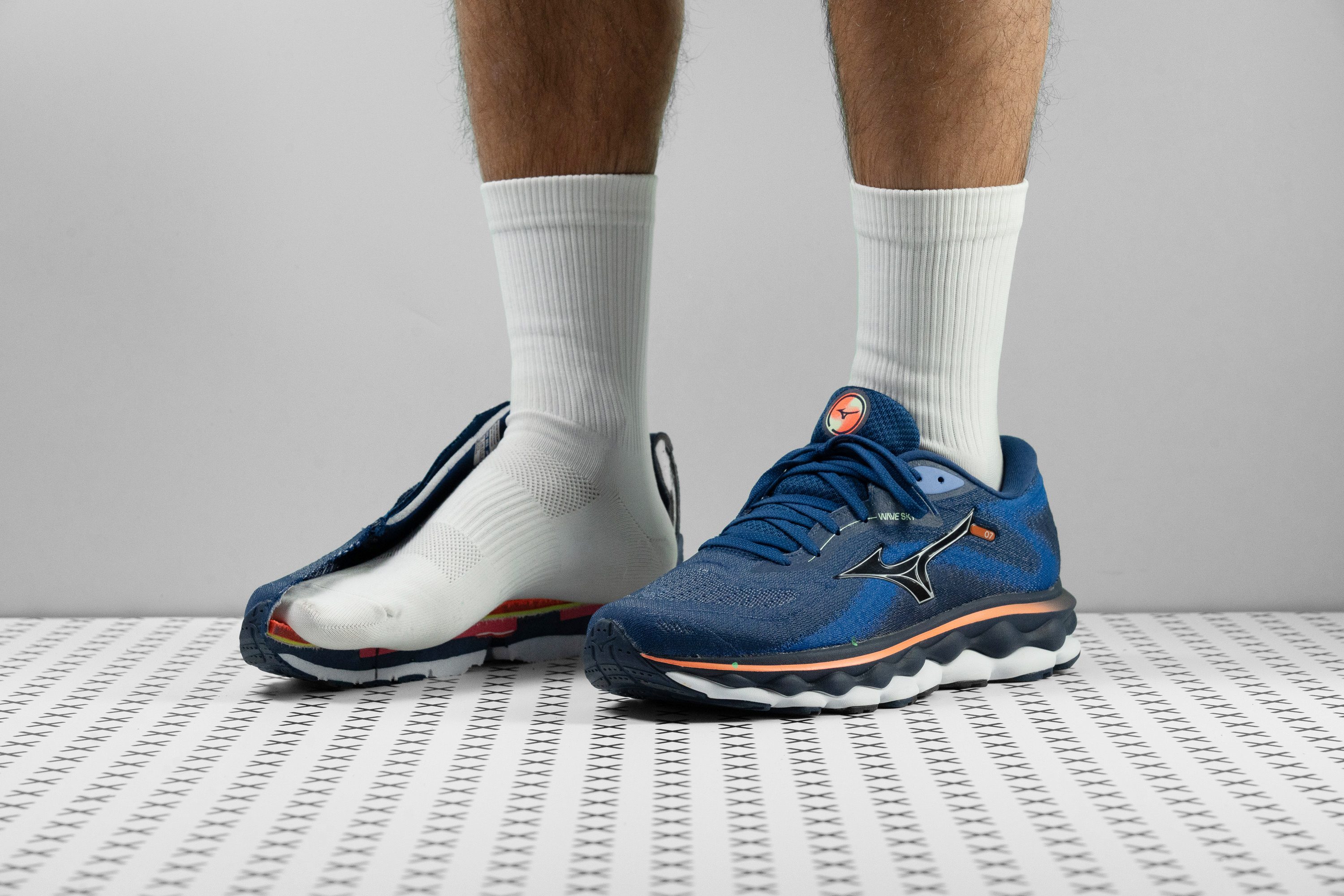Our verdict
- Top pick in best running shoes for heavy men (2024)
- Top pick in best Mizuno running shoes (2024)
Pros
- Great cushioning for long runs
- Fantastic outsole quality
- World-class durability
- Comfortable for all-day use
- Well-ventilated upper
- Outstanding stability
- Ideal for heel strikers
- Stable despite high stack
Cons
- Too heavy
- Limited energy return
- Clunky at fast paces
Audience verdict
Comparison
The most similar running shoes compared
+ + Add a shoe | |||||
|---|---|---|---|---|---|
| Audience score | 88 Great! | 89 Great! | 88 Great! | 90 Superb! | |
| Price | $170 | $160 | $180 | $180 | |
| Pace | Daily running | Daily running | Daily running | Daily running | |
| Shock absorption | - | High | High | High | |
| Energy return | - | Moderate | Low | Moderate | |
| Traction | - | High | High | High | |
| Arch support | Neutral | Neutral | Neutral | Neutral | |
| Weight lab Weight brand | 10.4 oz / 296g 10.7 oz / 303g | 9.9 oz / 282g 10 oz / 283g | 10.4 oz / 295g 0.4 oz / 10g | 9.6 oz / 272g 9.7 oz / 275g | |
| Drop lab Drop brand | 10.9 mm 8.0 mm | 8.7 mm 5.0 mm | 6.2 mm 6.0 mm | 9.4 mm 6.0 mm | |
| Strike pattern | Heel | HeelMid/forefoot | Mid/forefoot | HeelMid/forefoot | |
| Size | True to size | True to size | - | True to size | |
| Midsole softness | Balanced | Soft | Soft | Balanced | |
| Difference in midsole softness in cold | Small | Normal | Small | Small | |
| Toebox durability | Good | Decent | Good | Decent | |
| Heel padding durability | Good | Good | Good | Bad | |
| Outsole durability | Good | Good | Decent | Good | |
| Breathability | Moderate | Breathable | Moderate | Moderate | |
| Width / fit | Medium | Medium | Medium | Medium | |
| Toebox width | Medium | Narrow | Narrow | Medium | |
| Stiffness | Stiff | Stiff | Stiff | Stiff | |
| Torsional rigidity | Stiff | Stiff | Stiff | Stiff | |
| Heel counter stiffness | Moderate | Stiff | Stiff | Moderate | |
| Rocker | ✗ | ✗ | ✗ | ✓ | |
| Heel lab Heel brand | 40.9 mm 40.0 mm | 39.3 mm 39.0 mm | 44.3 mm 44.0 mm | 39.9 mm 37.0 mm | |
| Forefoot lab Forefoot brand | 30.0 mm 32.0 mm | 30.6 mm 34.0 mm | 38.1 mm 38.0 mm | 30.5 mm 31.0 mm | |
| Widths available | NormalWide | NormalWide | NormalWide | Normal | |
| Orthotic friendly | ✓ | ✓ | ✓ | ✓ | |
| Season | All seasons | SummerAll seasons | All seasons | All seasons | |
| Removable insole | ✓ | ✓ | ✓ | ✓ | |
| Ranking | #297 Top 44% | #119 Top 32% | #139 Top 37% | #45 Top 12% | |
| Popularity | #540 Bottom 21% | #94 Top 25% | #195 Bottom 49% | #189 Top 50% |
Who should buy
We've come to understand that the Mizuno Wave Sky 7 is an exceptional choice for a wide variety of runners. Here's why we think it stands out:
- It's perfect for those seeking a super-cushioned, neutral daily trainer. The Wave Sky 7 offers top comfort with a stability boost, ideal for long runs.
- Lovers of high-drop shoes will value its pronounced, non-rockered geometry. Plus, there's no concern about durability in the rearfoot area, as the outsole is designed to last forever.
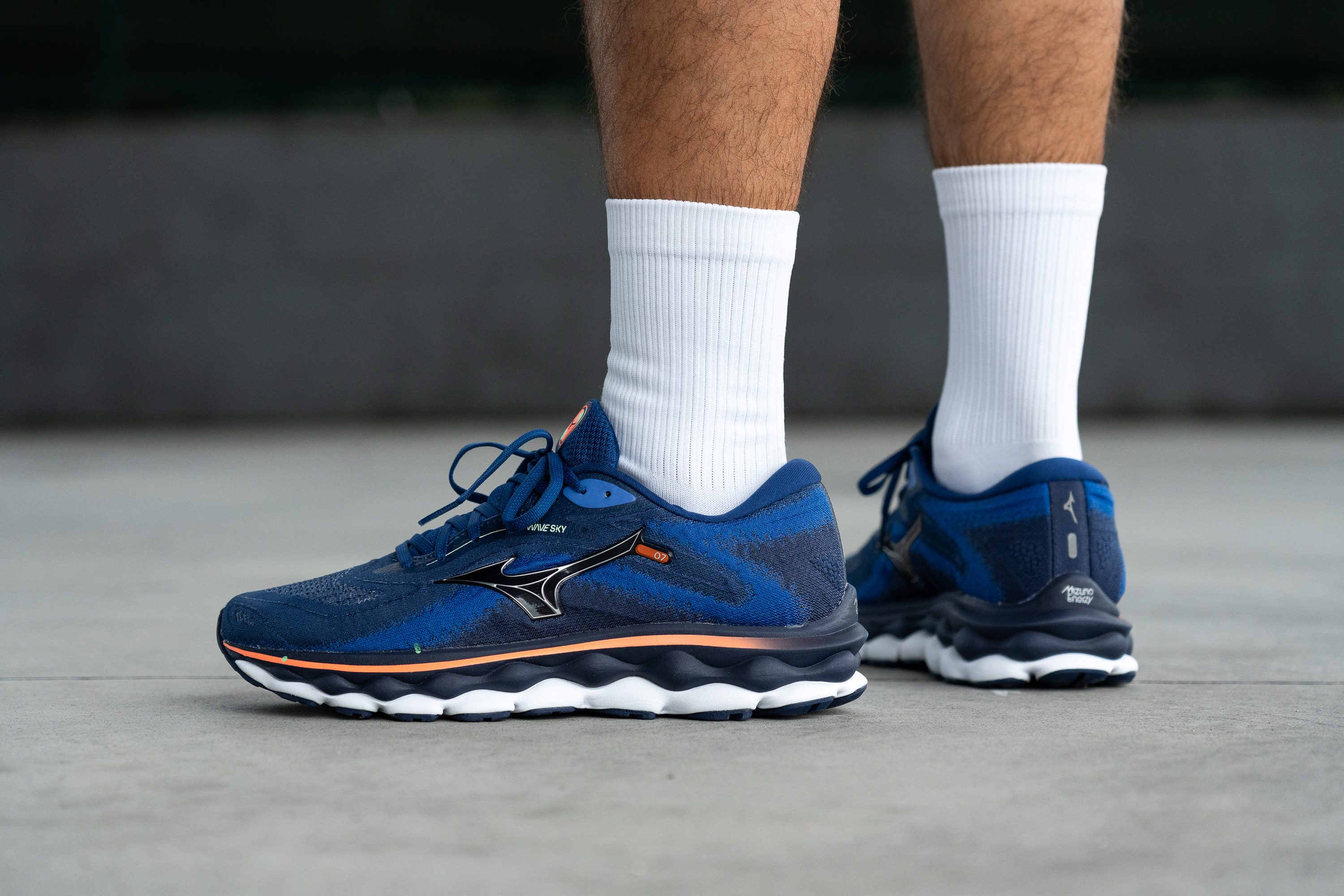
Who should NOT buy
The Mizuno Wave Sky 7, while a solid pick for many runners, comes with a steep price tag of $170. For those seeking a cushioned daily trainer without such a hefty investment, we recommend considering the ASICS Novablast 4 or the budget-friendly Saucony Axon 3.
In our lab review, we also observed that the Wave Sky 7 primarily caters to heel strikers. If you're a midfoot or forefoot striker, we think there are better choices available. We suggest checking out the Hoka Clifton 9 or the ASICS Superblast.
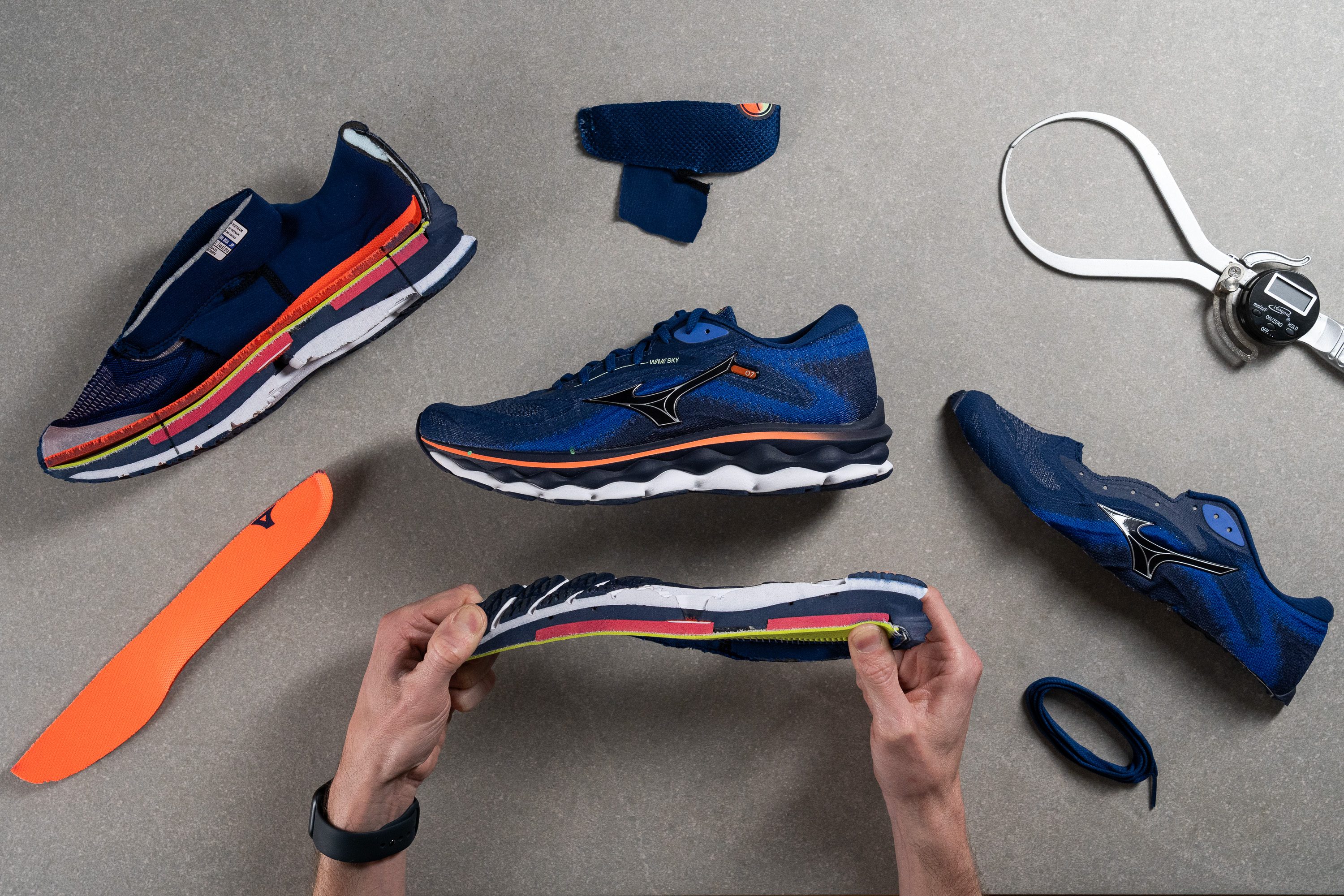
Lastly, if you're a fan of ultra-soft midsoles, the Wave Sky 7 offers a more balanced feel. We think the Nike Invincible 3 would be a better choice for that extra plush experience.
Cushioning
Heel stack
To give credit where it's due, the Wave Sky 7 justifies its weight with its impressive stack height.
Boasting a substantial 40.9 mm, it packs a generous amount of foam in the heel. This makes it one of the best shoes on the market for heel strikers seeking a plush, cushioned ride.
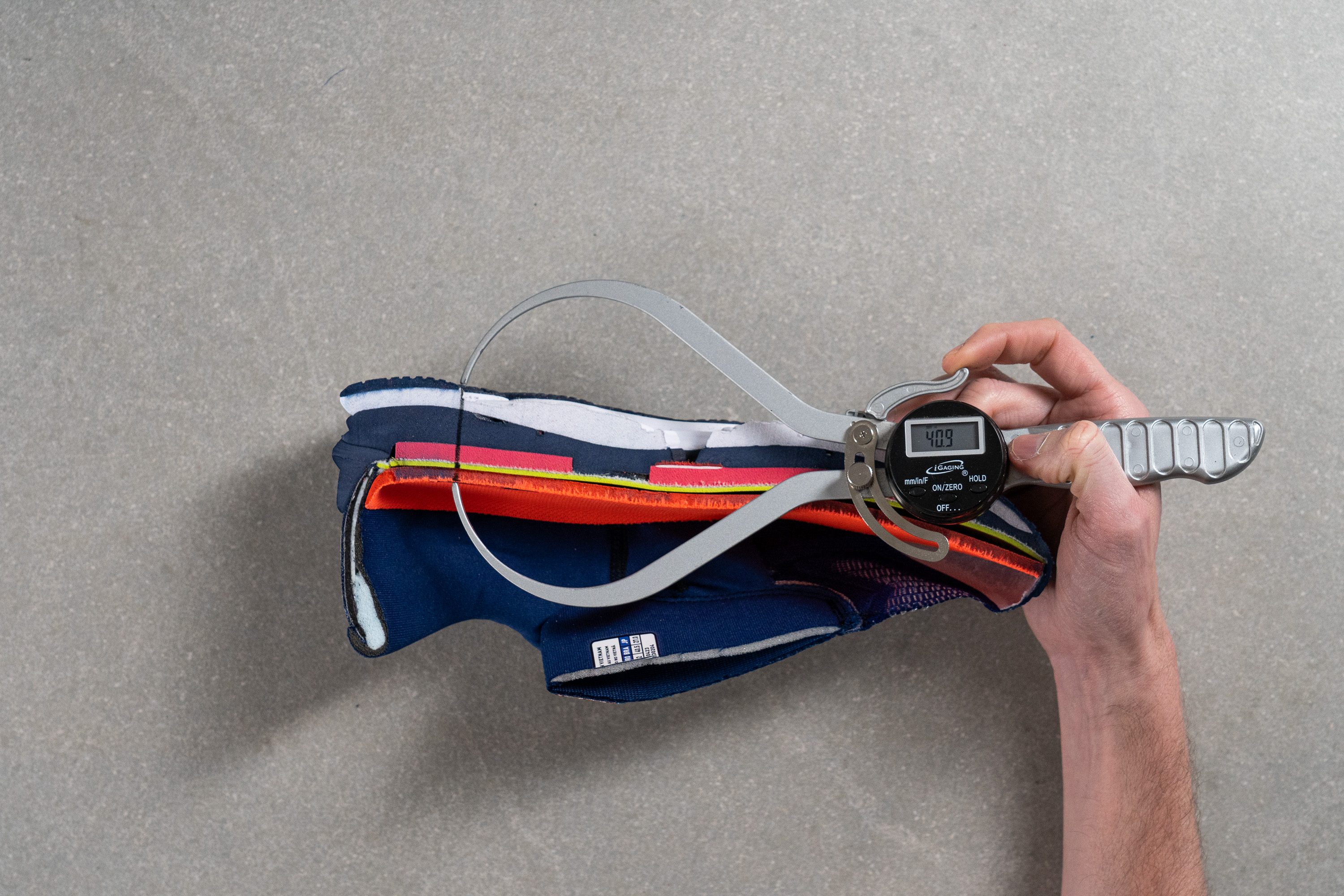
| Wave Sky 7 | 40.9 mm |
| Average | 34.8 mm |
Forefoot stack
The forefoot of the Wave Sky 7 is also well-cushioned at 30.0 mm. This makes it great for midfoot or forefoot strikers aiming for even 20-mile long runs.
Plus, there's a full guarantee that this midsole won't bottom out.
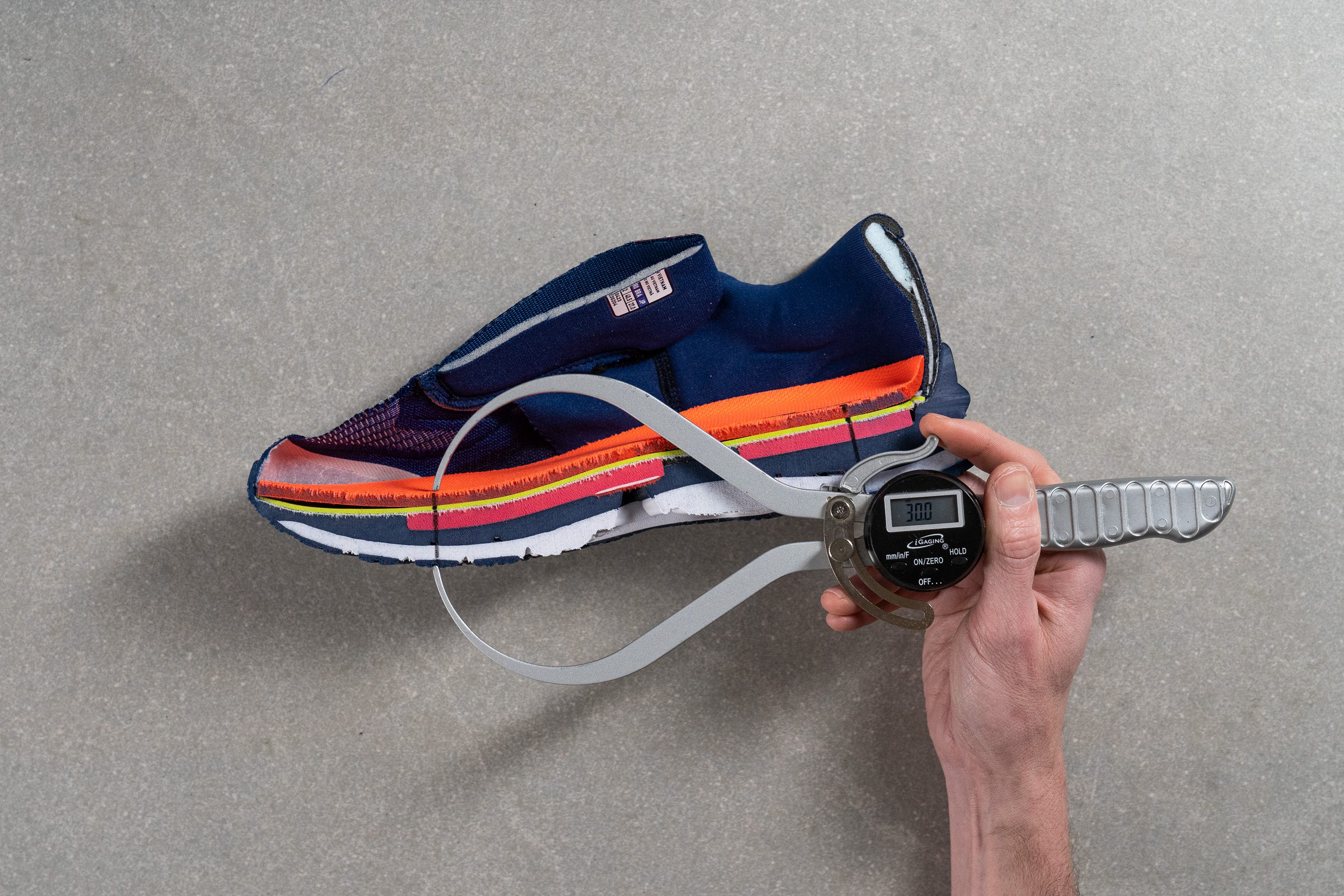
| Wave Sky 7 | 30.0 mm |
| Average | 26.2 mm |
Drop
In the lab, we measured the drop—the difference between the heel and forefoot height—at 10.9 mm. This slightly deviates from the 8-mm offset claimed by the brand, but we're already used to this situation.
However, it still falls within the high-drop range of 8-12 mm. This design slightly favors heel strikers, or midfoot/forefoot strikers who prefer this geometry.
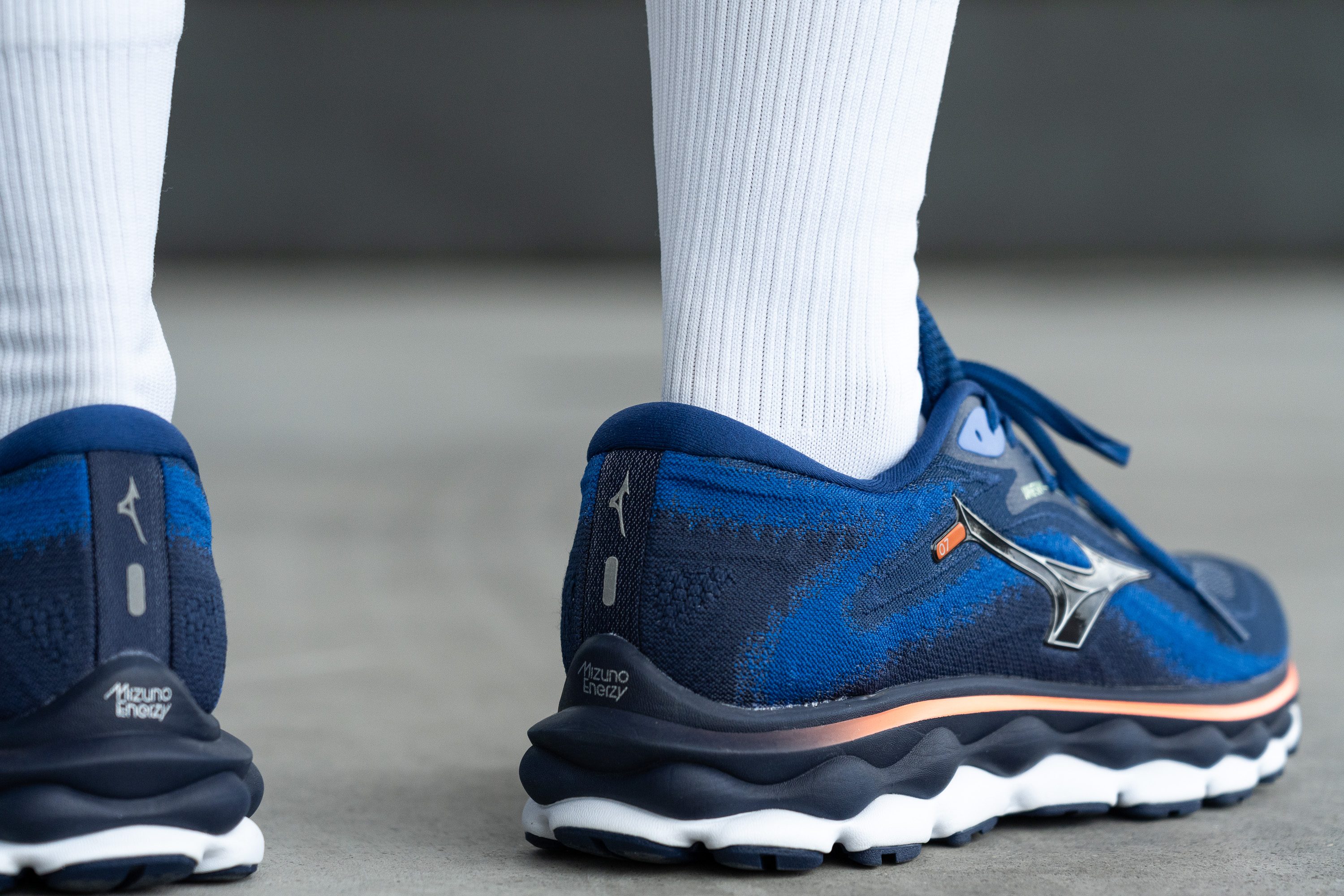
| Wave Sky 7 | 10.9 mm |
| Average | 8.6 mm |
Midsole softness
Now, let's take a look at the midsole. The main foam is Enerzy, a TPE-based compound that offers a balanced softness (22.0 HA) with good energy return. It's not as soft as a cloud, but it feels plush. And we can assure you it's more responsive than regular EVA, which was a must based on the $170 price of this shoe.
However, the Mizuno Wave Sky 7 also features the Enerzy Core foam, which we'll discuss next.
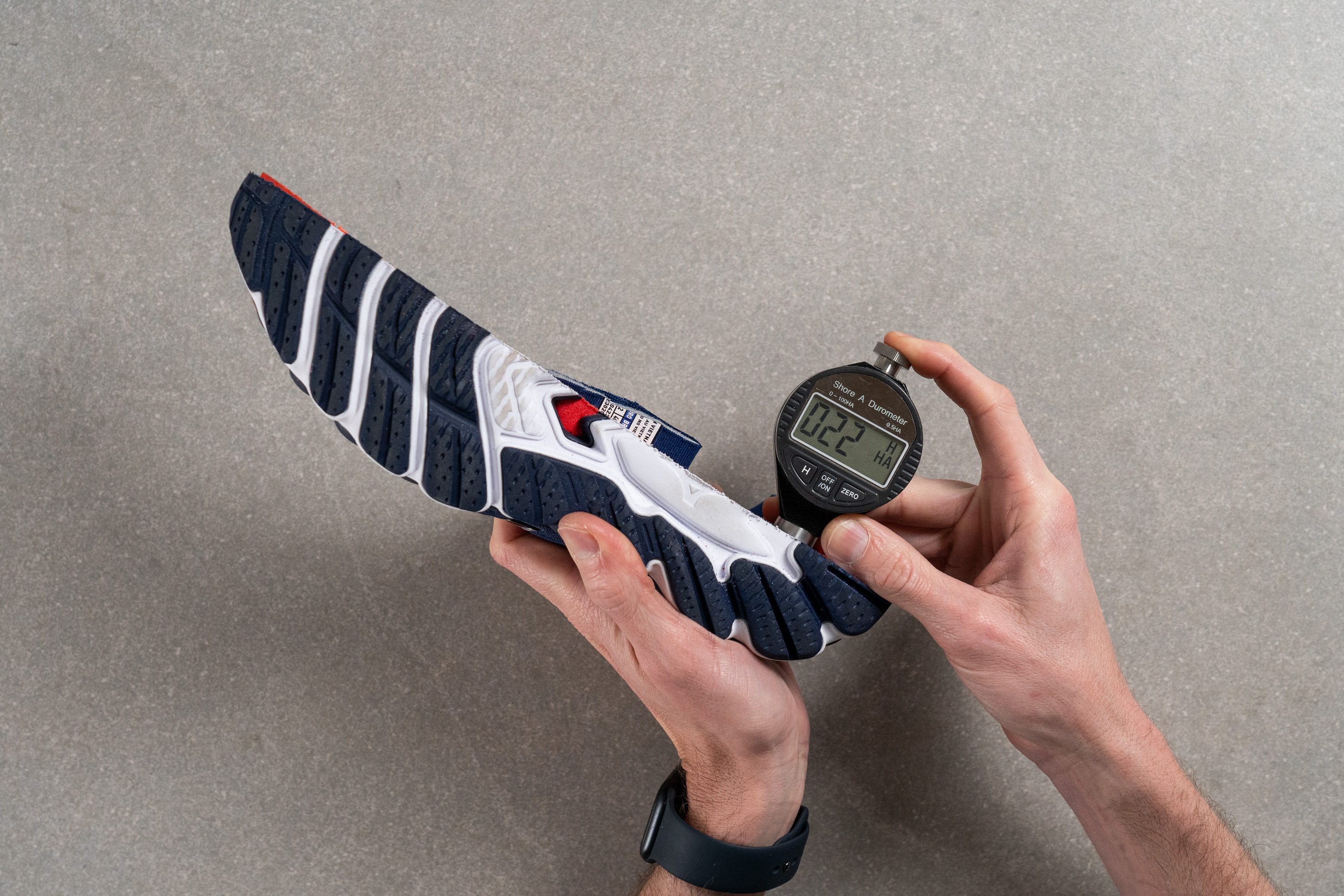
| Wave Sky 7 | 22.0 HA |
| Average | 20.4 HA |
Secondary foam
As you can see in the picture below, Mizuno presents the midsole in three different colors. However, two of these—the white and blue—are the same Enerzy foam. There are also two small slabs of the special, incredibly soft Energy Core (red) foam.
Mizuno has strategically placed this ultra-soft, 3.0-HA foam under the forefoot and heel, resulting in a pillowy sensation while running. This is a clever design, as the shoe feels really comfy and soft, despite its main 22.0-HA foam that keeps the shoe stable.
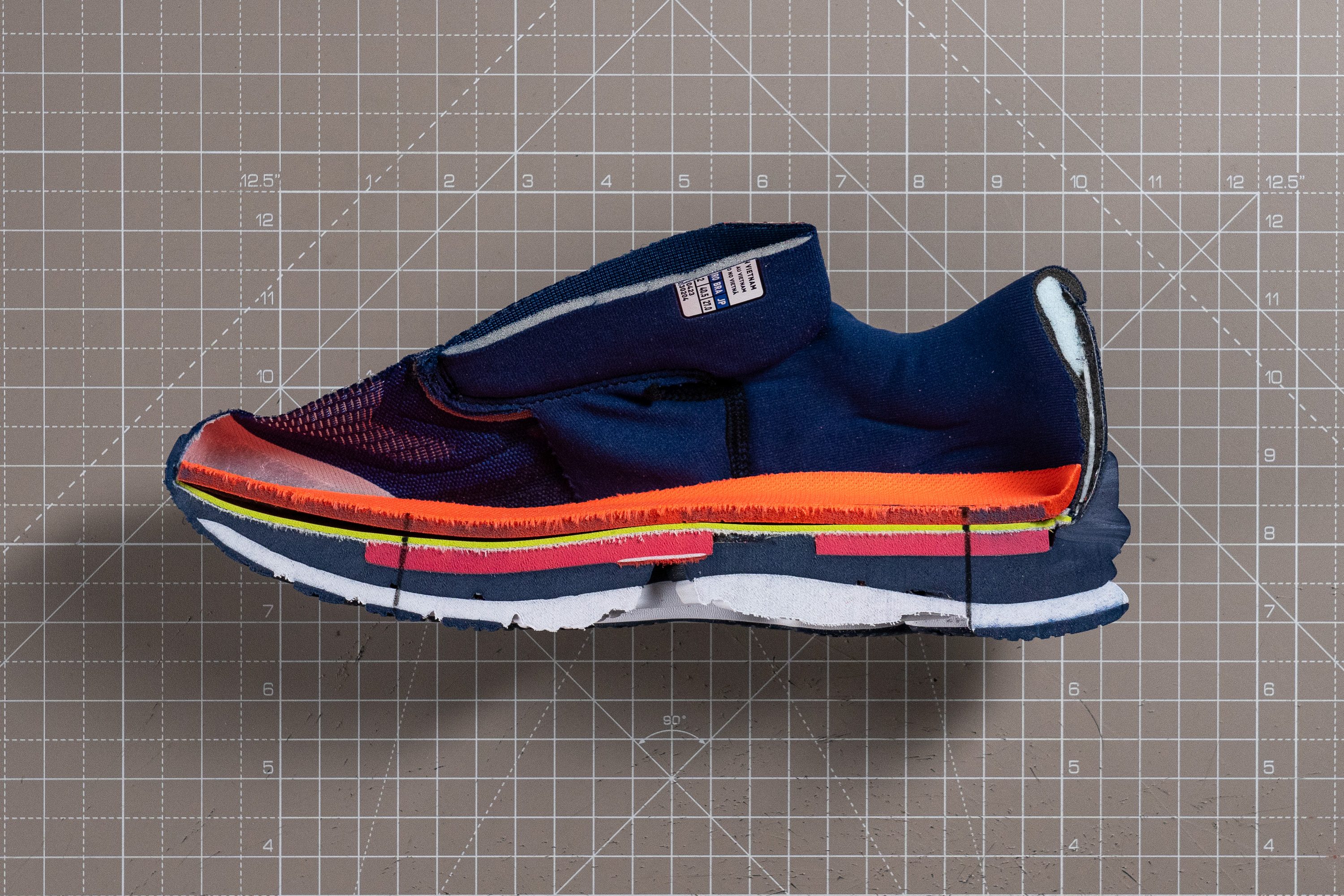
| Wave Sky 7 | 3.0 HA |
| Average | 22.7 HA |
Size and fit
Size
Mizuno Wave Sky 7 fits true to size (21 votes).
Internal length
| Wave Sky 7 | 272.2 mm |
| Average | 269.4 mm |
Width / Fit
Now let's talk about the toebox. The widest part of the Wave Sky 7's upper measures 98.9 mm. This matches our experience when trying on the shoe as an average fit.
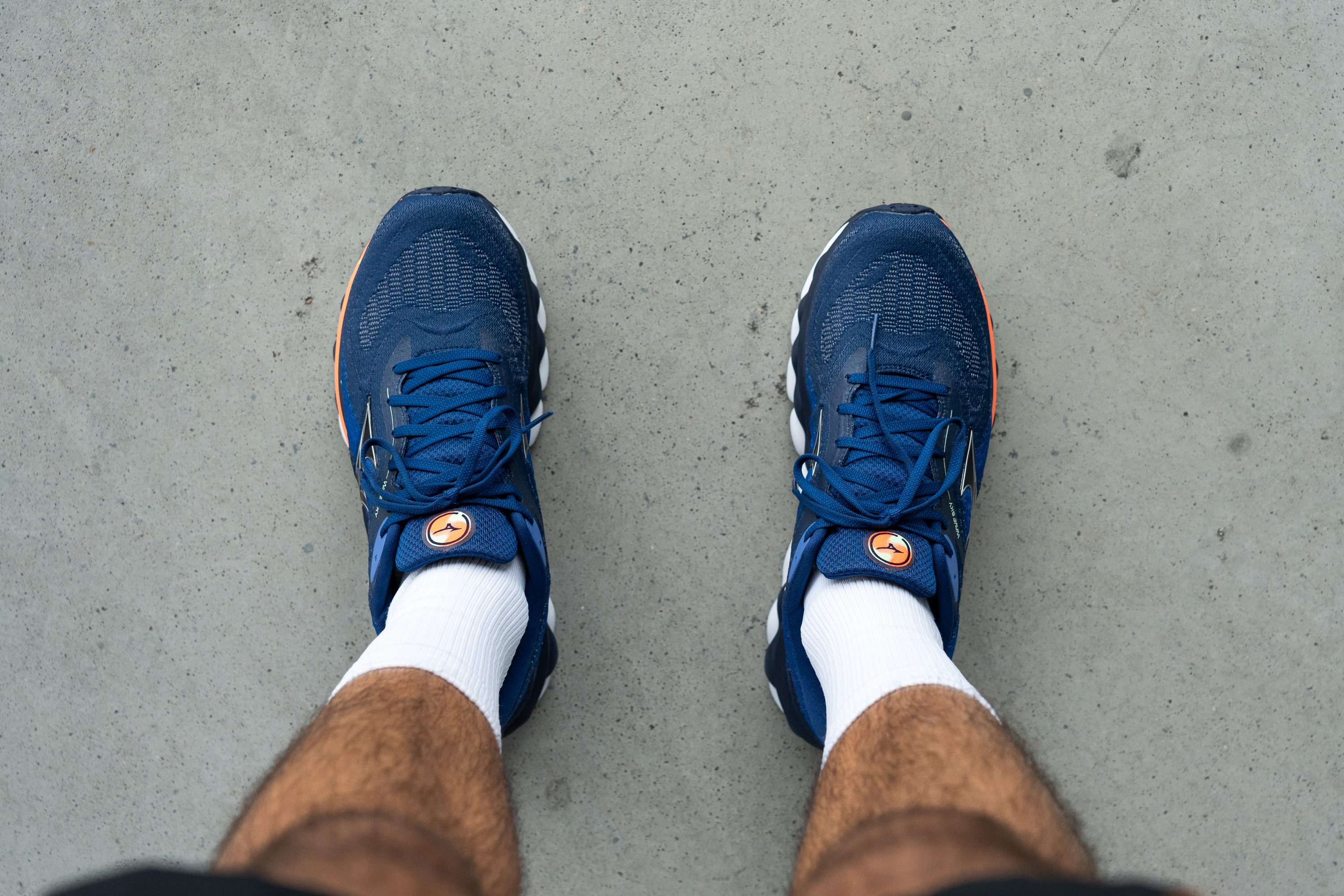
It offers enough room for about 80% of runners. However, those in the 20% with extremely narrow or wide feet might prefer other shoes that better suit their foot shape.
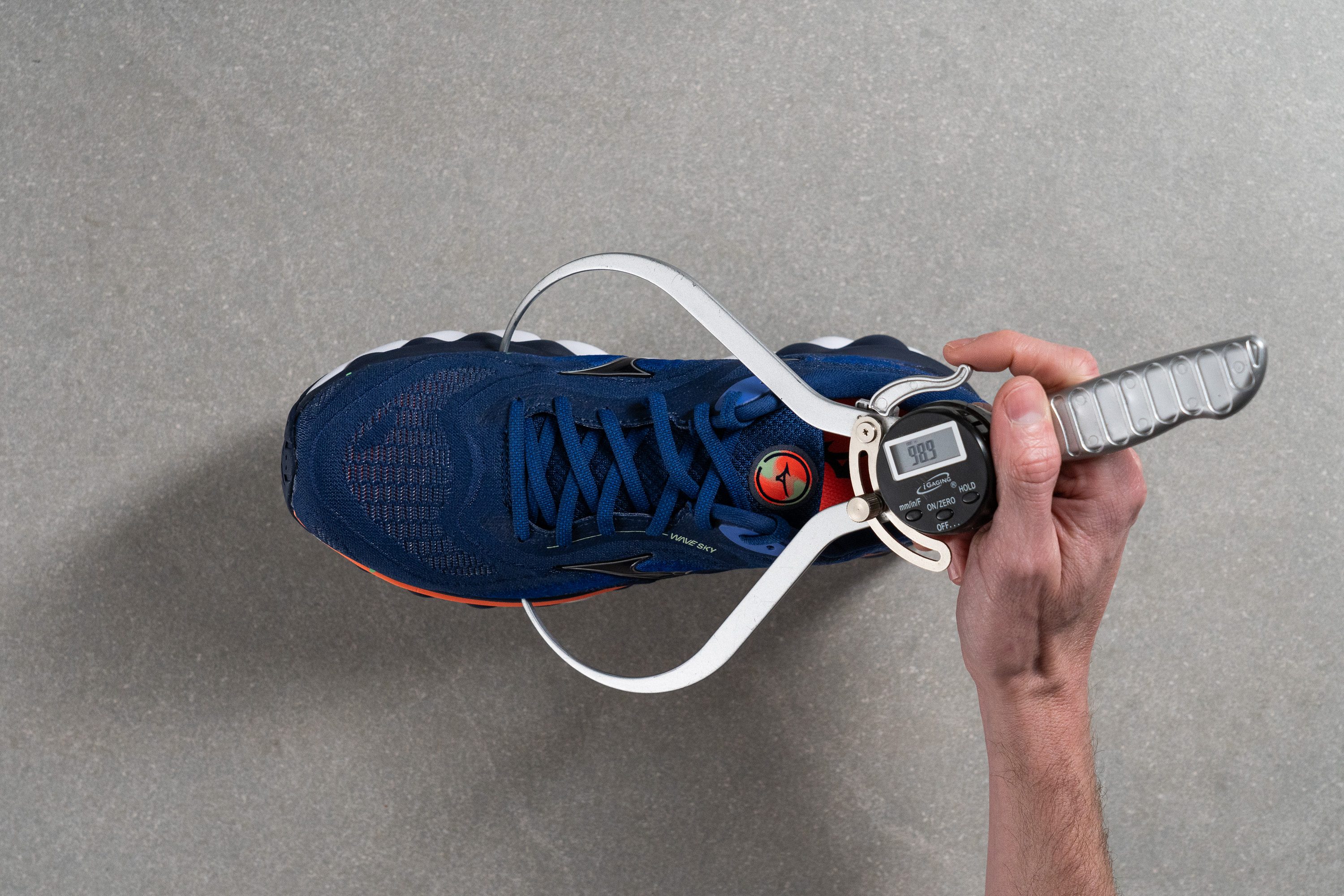
This test follows an older methodology, which is why you don't see recently tested shoes in the chart. Results from different methodologies can not be compared.
| Wave Sky 7 | 98.9 mm |
| Average | 98.5 mm |
Toebox width
In the big toe area, the Wave Sky 7 offers the same average feel as before.
We measured it at 78.0 mm, showing that the shoe doesn't have an aggressive taper, which is a good thing.
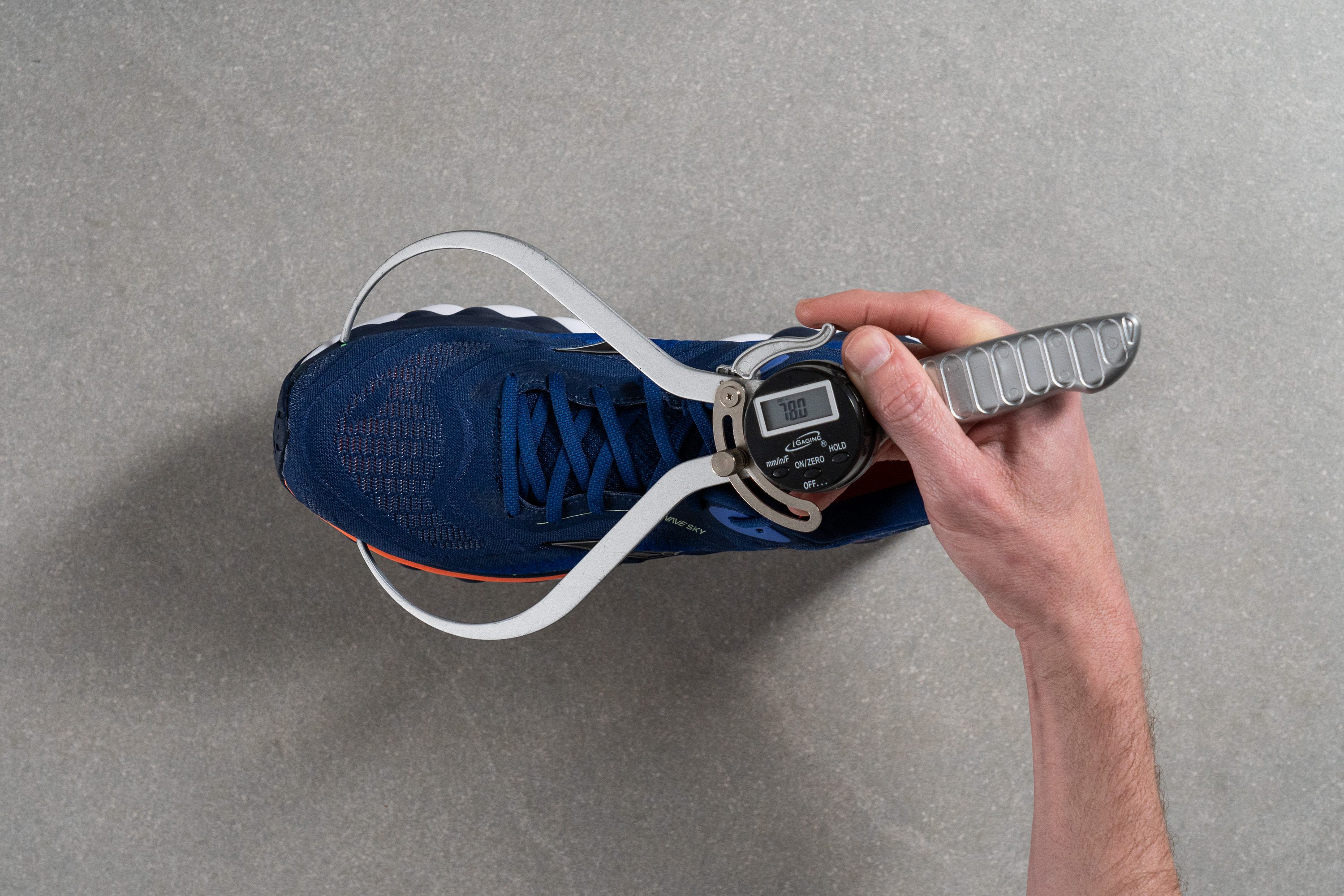
This test follows an older methodology, which is why you don't see recently tested shoes in the chart. Results from different methodologies can not be compared.
| Wave Sky 7 | 78.0 mm |
| Average | 78.4 mm |
Flexibility / Stiffness
If you have a sharp memory, you might recall that at the start of this lab review, we discussed the forefoot cutouts Mizuno incorporated. These served two purposes—to shave off some weight and enhance the shoe's flexibility.
Flexibility is crucial for a daily trainer, especially for a 40-mm shoe with a thick outsole, as this typically adds stiffness and hinders comfort. Thankfully, those cutouts enable the Wave Sky 7 to offer a moderately flexible ride. In our 90-degree bend test, we needed only 28.9N of force to bend it, which is pretty standard.
This test follows an older methodology, which is why you don't see recently tested shoes in the chart. Results from different methodologies can not be compared.
| Wave Sky 7 | 28.9N |
| Average | 28.1N |
Stiffness in cold (%)
We conducted the 20-minute freezer test again to gauge the shoe's stiffness in extreme winter conditions. Afterwards, it took us 37.8N of force to bend the shoe, which is 30.5% more than usual. Not that good!
| Wave Sky 7 | 31% |
| Average | 33% |
Weight
Weighing in at 10.4 oz (296g), this is one of the shoe's less impressive features.
To be clear, it's not overly heavy, but we believe that with some adjustments, especially to the outsole, it could easily drop below 10 oz. Such a change would significantly enhance the shoe's versatility .
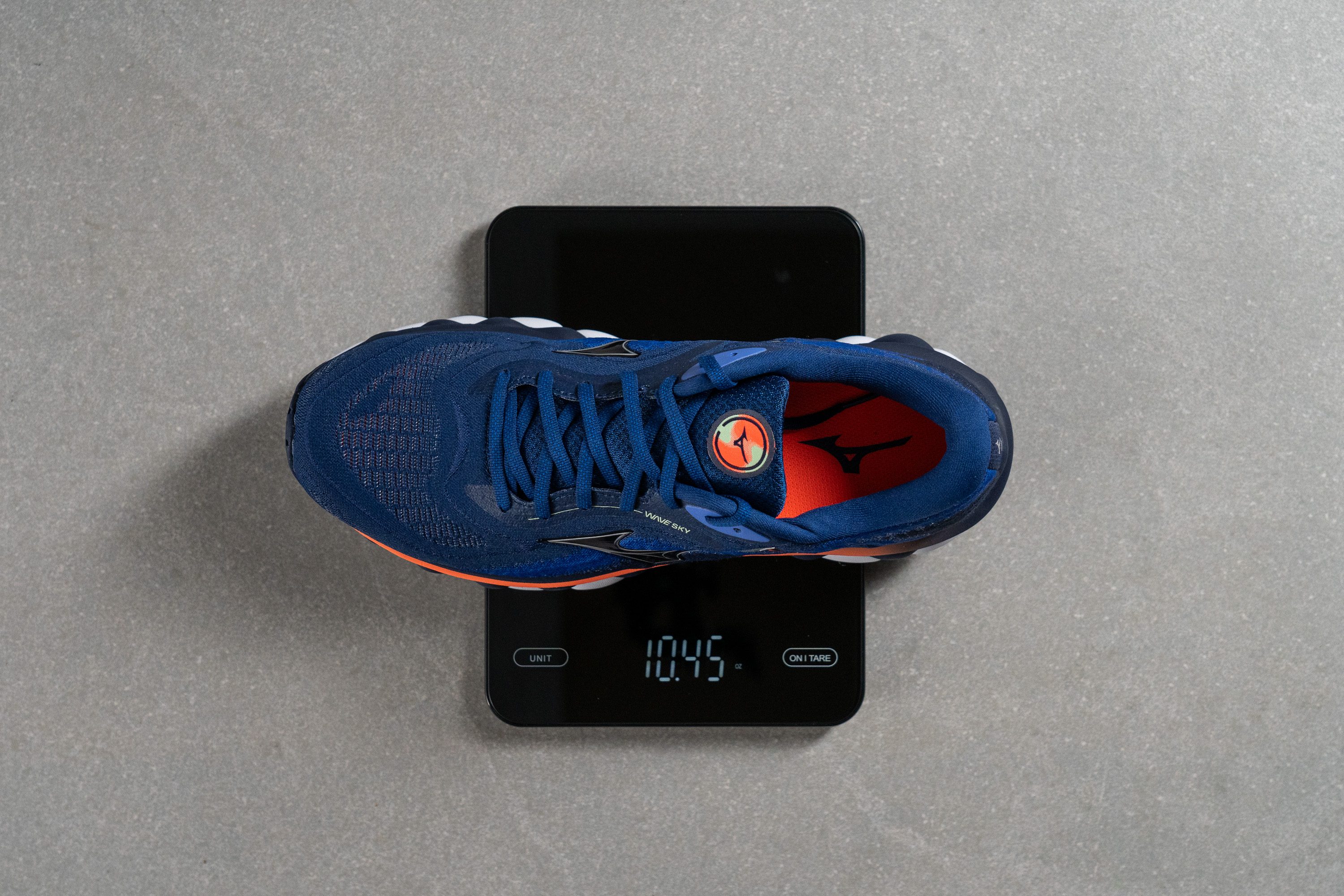
| Wave Sky 7 | 10.4 oz (296g) |
| Average | 9.3 oz (264g) |
Breathability
Our first impression of the Mizuno Wave Sky 7 began with its breathability—one of the key features in any running shoe, especially for those who run in warm weather.
The Smooth Stretch Woven mesh met our expectations, earning a solid 4/5 in our smoke test. This result confirmed good airflow, although not the best. But that's not a downside for everyone—if you also run in cooler weather, a 4/5 it's better than a 5/5.
There are various ways to optimize ventilation in a running shoe. Mizuno chose to focus on a highly breathable toebox while keeping the rest less ventilated to add structure to the upper.
This works well for most runners, but if you often have hotspots in your midfoot, we think this shoe can give you some troubles in summer. Now, let's turn on the microscope.
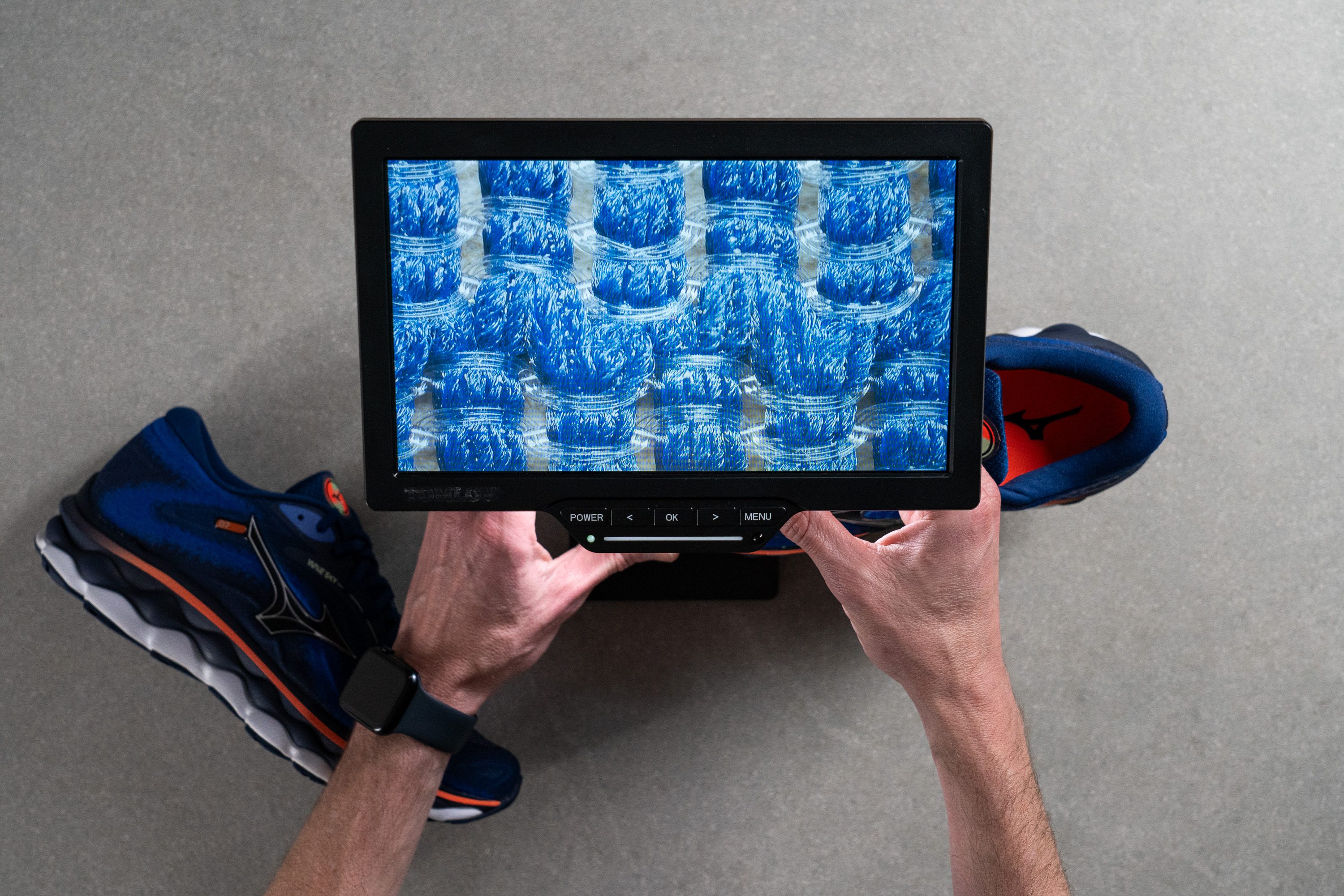
In the lab, we've noticed Mizuno loves to do different stuff, sometimes taking unique approaches like with their bizarre Wave Rebellion Pro. That's why we weren't surprised to found that the Wave Sky 7's mesh was one of a kind.
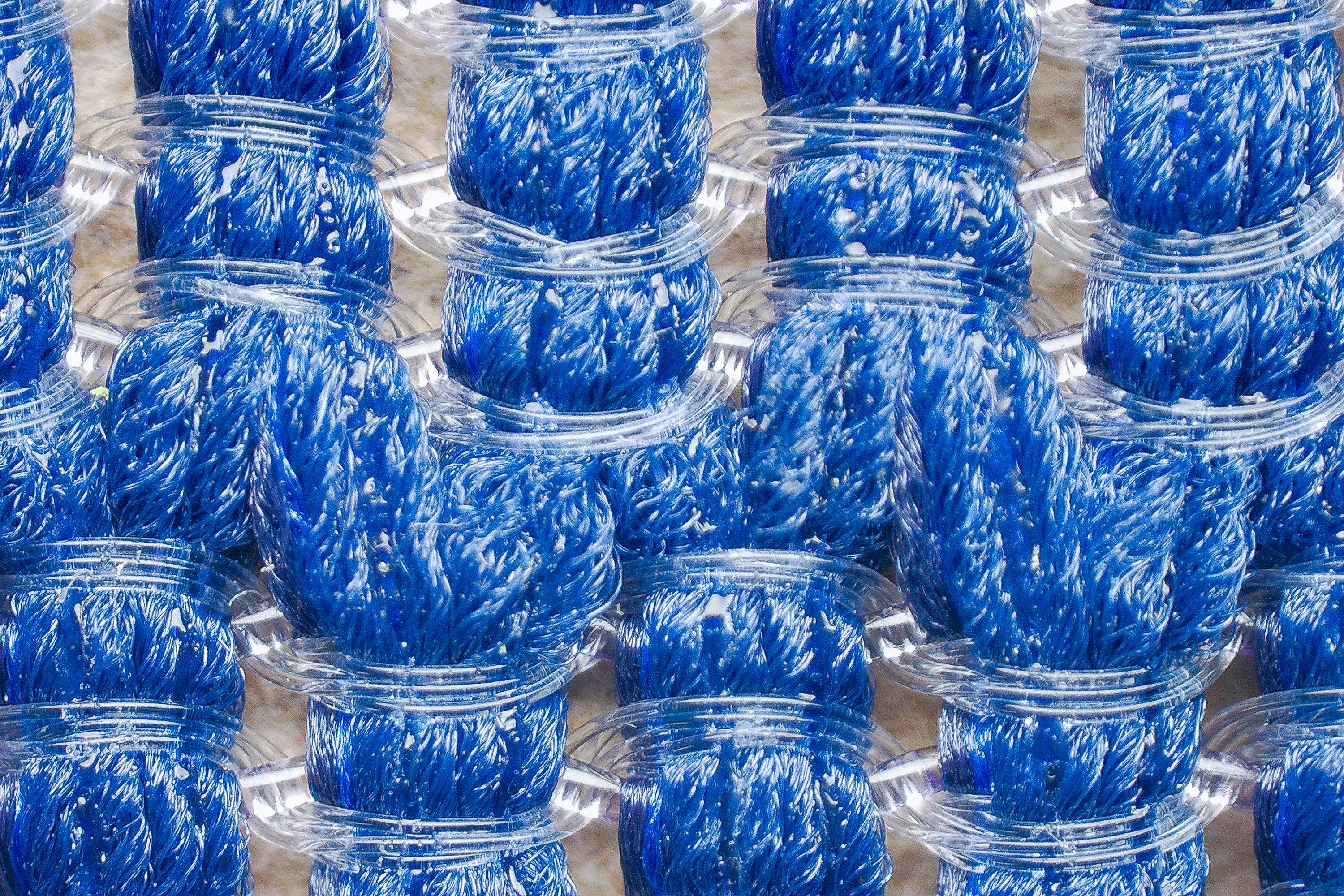
Finally, we closely examined the upper. It's slightly stretchy in the forefoot, just where it's needed, and very padded in the rear—exactly what we expect from a comfort-focused, premium-priced daily running shoe.
| Wave Sky 7 | 4 |
| Average | 3.7 |
Stability
Lateral stability test
We always felt more stability in the Wave Sky 7 than in most other 40-mm shoes, and this is thanks to the clever midsole design we mentioned earlier.
But crafting a neutral, stable trainer requires more than just that. Let's discuss what else contributes to this stability.
Torsional rigidity
One of the key factors in the shoe's stability is its torsional rigidity. We rated it at 4/5, which is a wise approach. Any more rigidity could have made the shoe uncomfortable for many runners. Fortunately, they found the perfect balance for this 40-mm shoe, or at least we think so.
| Wave Sky 7 | 4 |
| Average | 3.5 |
Heel counter stiffness
This Mizuno uses a standard heel counter to ensure the heel stays secure yet comfortable. We rated it 3 out of 5 for this feature.
This rating strikes a good balance between comfort and stability, as we must remember that this is a neutral shoe.
| Wave Sky 7 | 3 |
| Average | 2.9 |
Midsole width - forefoot
For the midsole dimensions, we began with the forefoot. Measuring 114.7 mm, it's about average, which makes sense for this neutral shoe.
It definitely doesn't require a wider base like the stability-oriented Mizuno Wave Inspire 19 does. And we suggest checking that one if you need a supportive ride, as it's another great shoe.
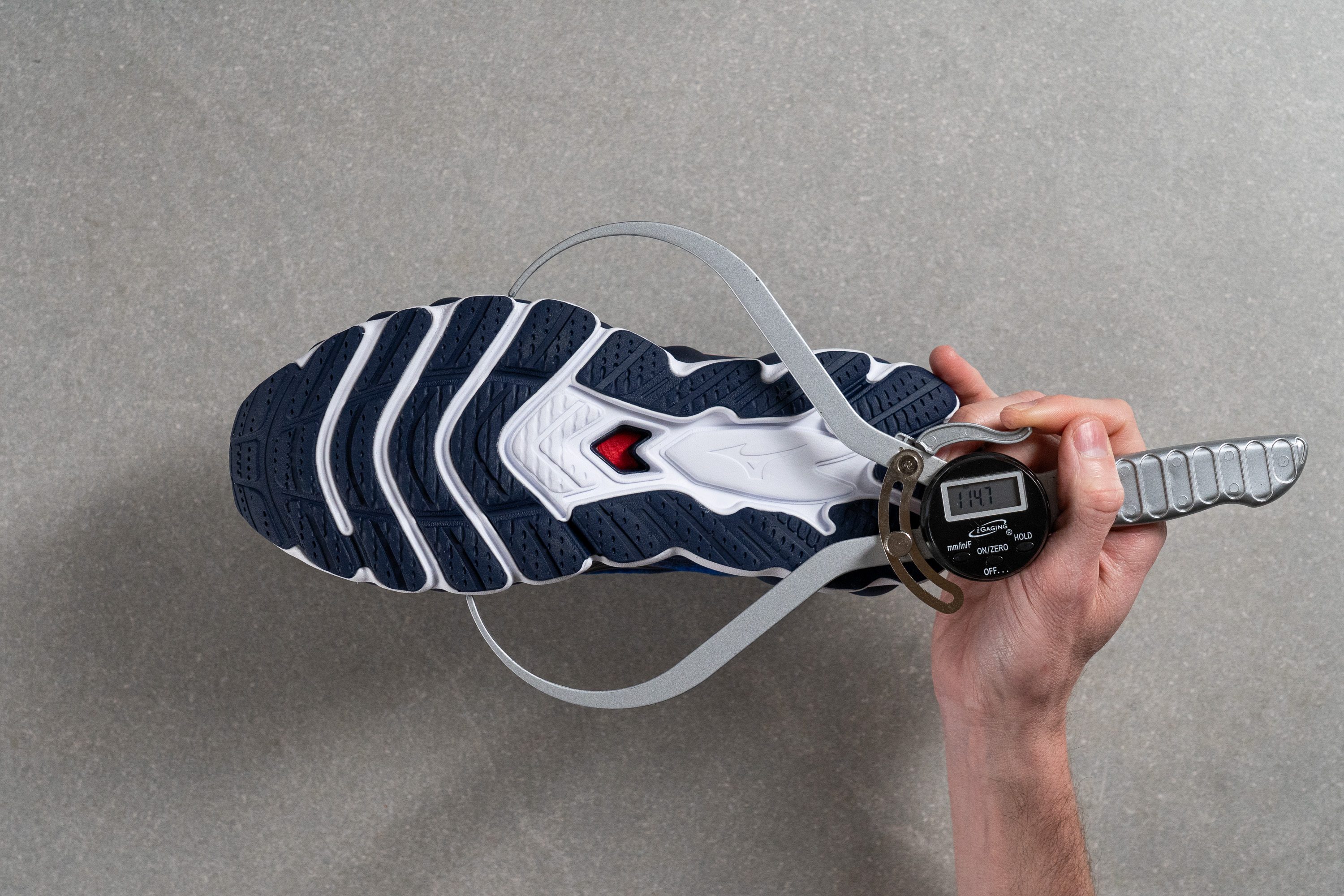
| Wave Sky 7 | 114.7 mm |
| Average | 114.4 mm |
Midsole width - heel
In the heel, Mizuno opted for a slightly wider design at 95.3 mm. This targets heel strikers, who are often the main users of daily trainers like these, as they make up a large portion of runners.
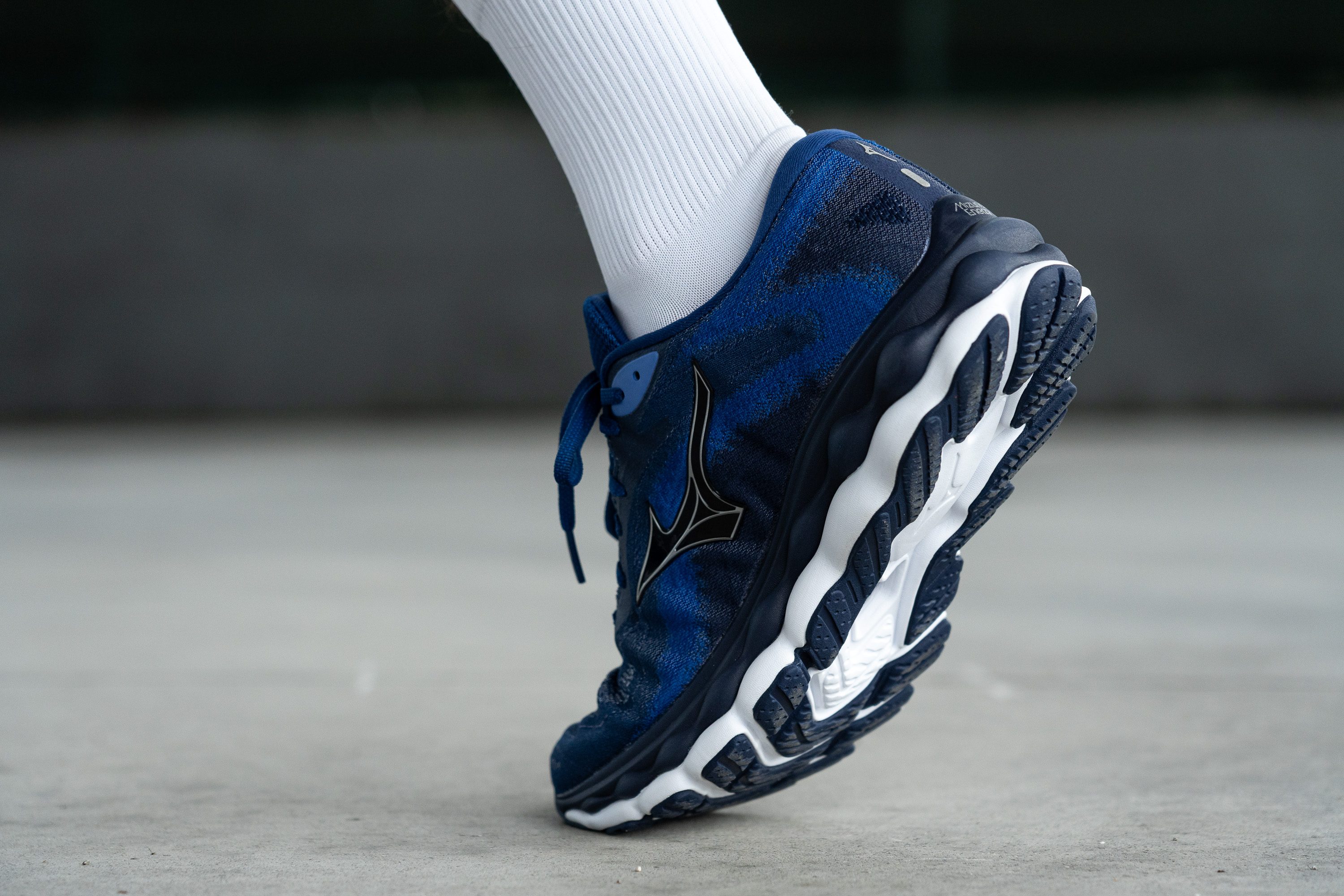
However, it feels just as wide as most other daily trainers, so there's no concern about clunkiness.
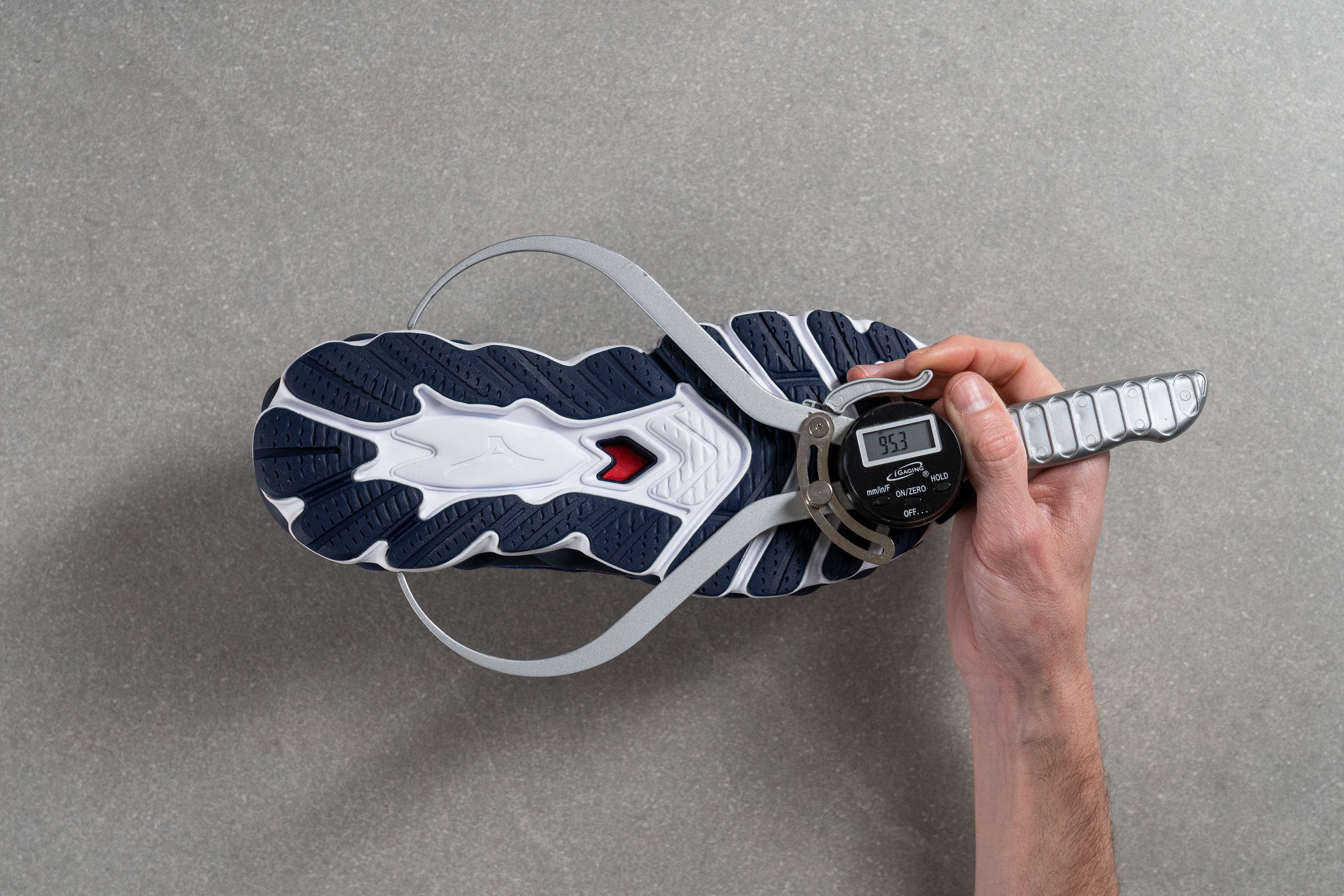
| Wave Sky 7 | 95.3 mm |
| Average | 90.6 mm |
Durability
Toebox durability
Just as we mentioned earlier, the toebox on this shoe is truly unique. Mizuno has enhanced the mesh with microscopic, transparent yarn—a costly technique that will go unnoticed by almost anyone, but not for us.
In this test, it made a significant difference. When we put the shoe against the Dremel, it performed exceptionally, earning a rare 5/5 score among road shoes. Remarkably, it achieved this with incredible ventilation, which is simply astounding.
Oh, and what about the ingenious reinforcement in the toebox, next to where we conducted our Dremel test? This is a smart move by Mizuno, perfect for runners who tend to wear holes—usually women—in the mesh by pointing their big toes upward while running. We just loved it.
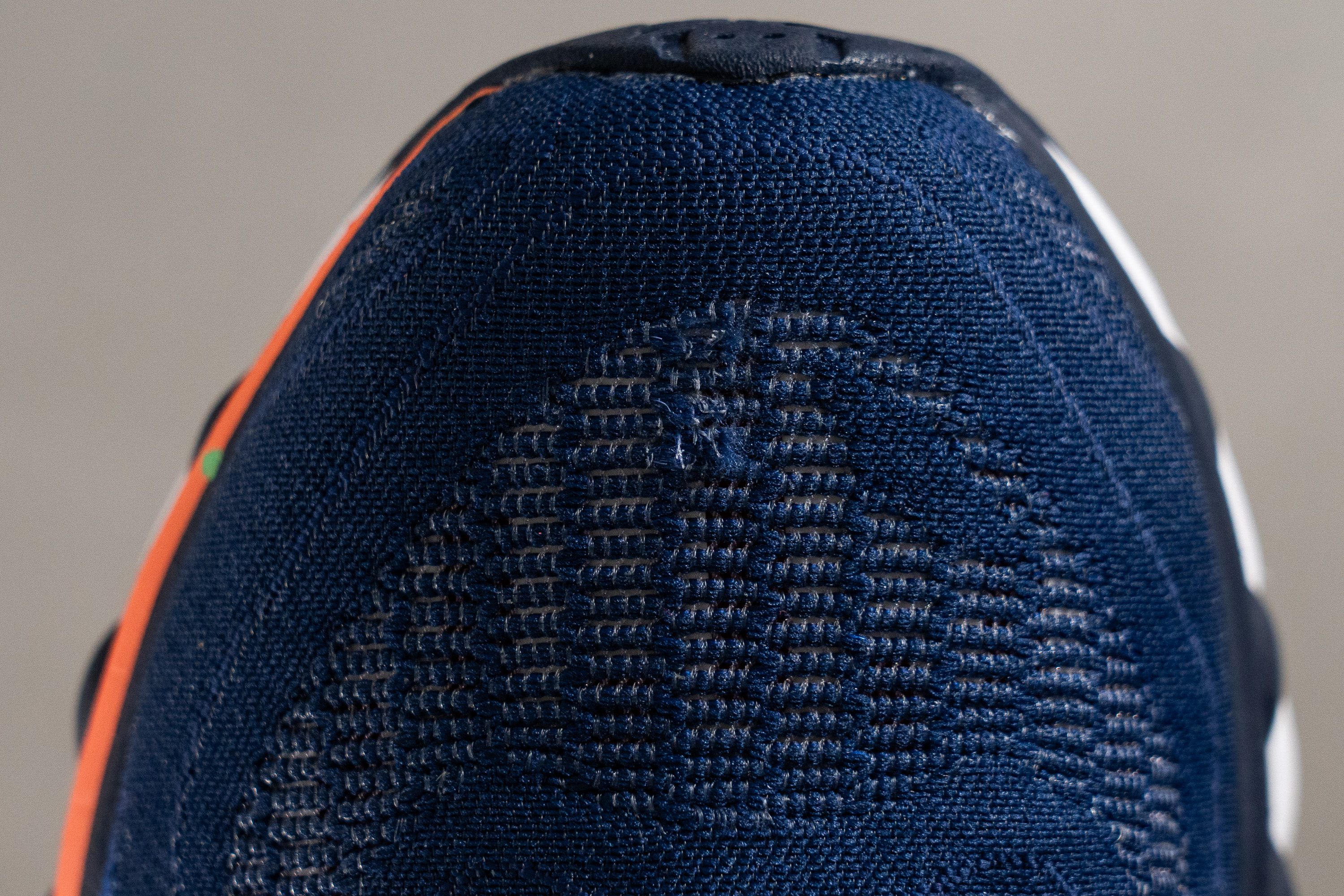
| Wave Sky 7 | 5 |
| Average | 2.6 |
Heel padding durability
Encouraged by the previous result, we eagerly moved to the heel to conduct the same test in the padded area that surrounds the Achilles.
Once again, the Wave Sky 7 impressed us, scoring a solid 4/5.
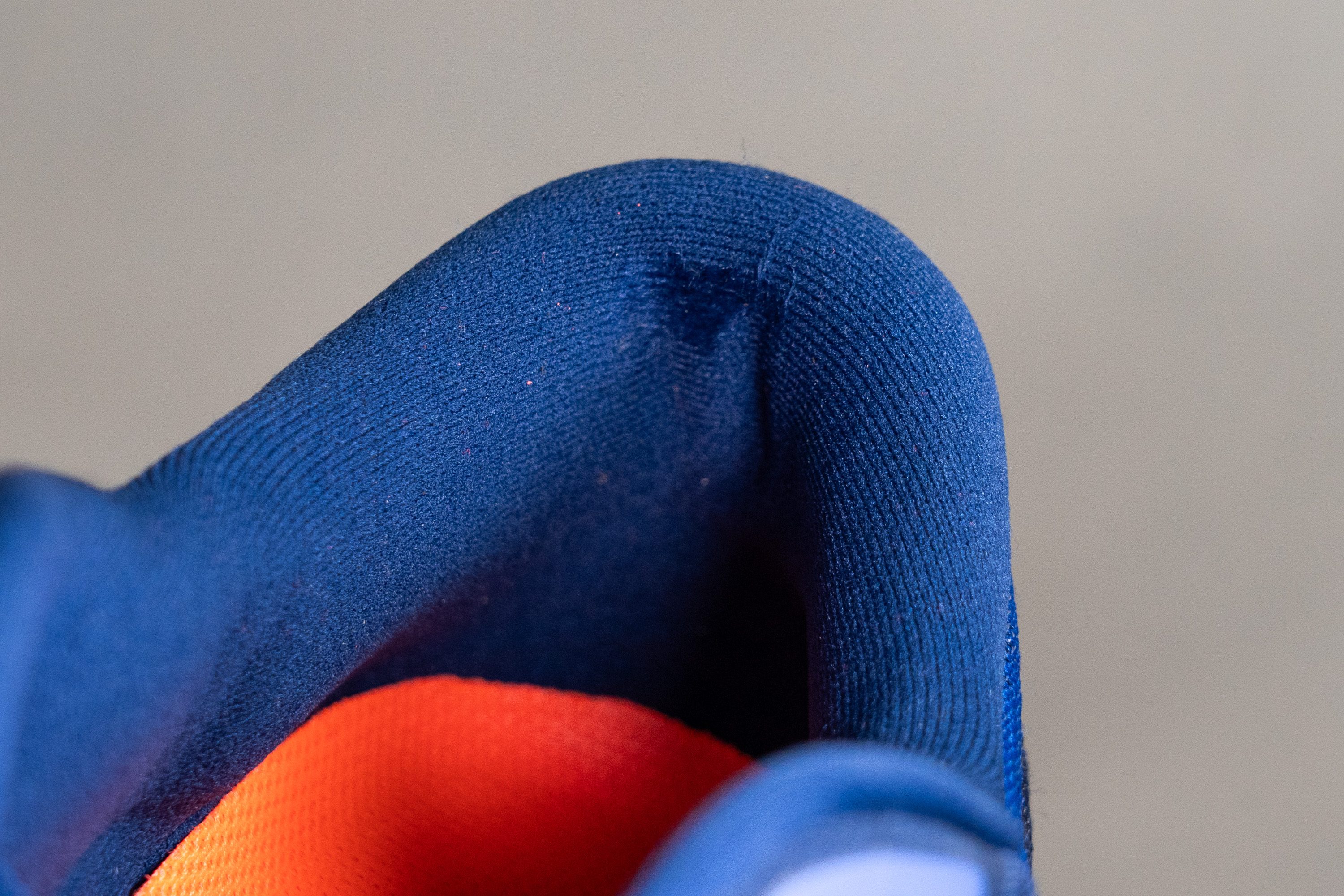
| Wave Sky 7 | 4 |
| Average | 3.4 |
Outsole hardness
Now, we turned our attention to the outsole. For many runners, this part is more critical regarding wear and tear than the upper.
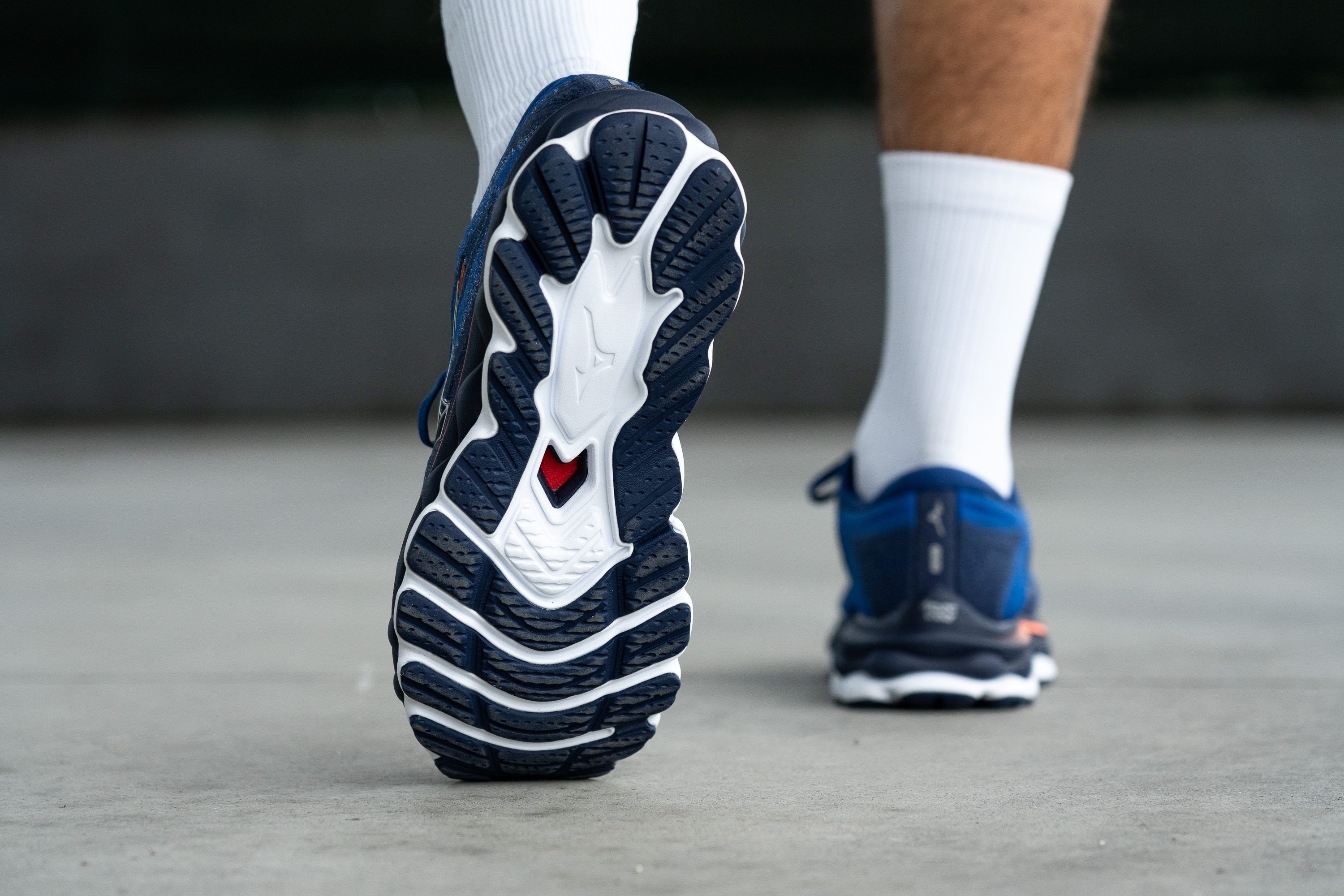
Our first measurement focused on the X10 Carbon rubber (81.6 HC), a common compound in premium Mizuno shoes. In terms of hardness, it's just average, seeking a blend of durability and grip.
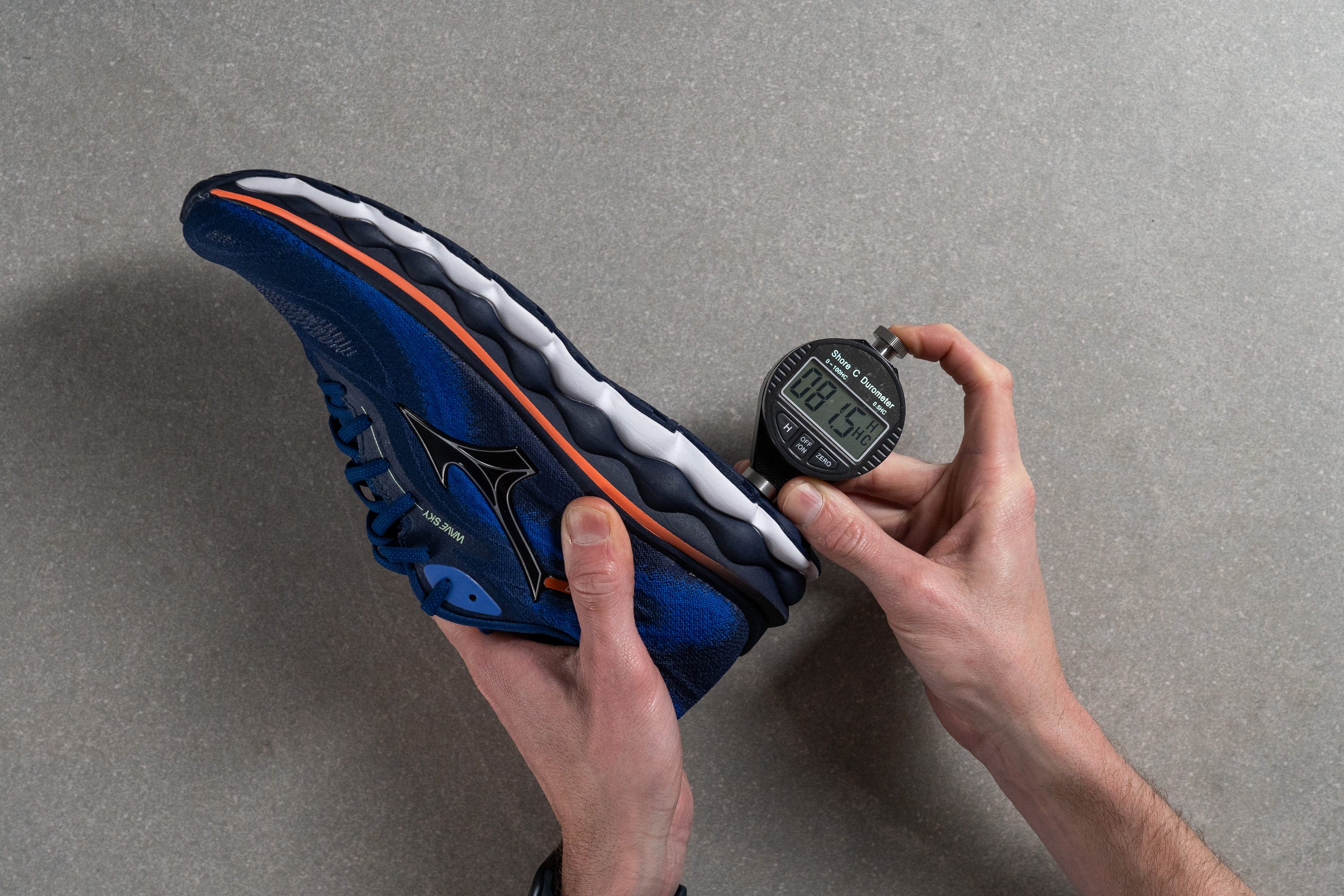
| Wave Sky 7 | 81.6 HC |
| Average | 79.2 HC |
Outsole durability
But how durable is it? In the lab, we found that the X10 rubber truly lives up to expectations.
We conducted our final Dremel test, putting the rubber through a rigorous challenge at 10K RPM. Afterwards, we only noticed a minimal 0.5-mm indentation—a fantastic result! This shoe is just built like a tank.
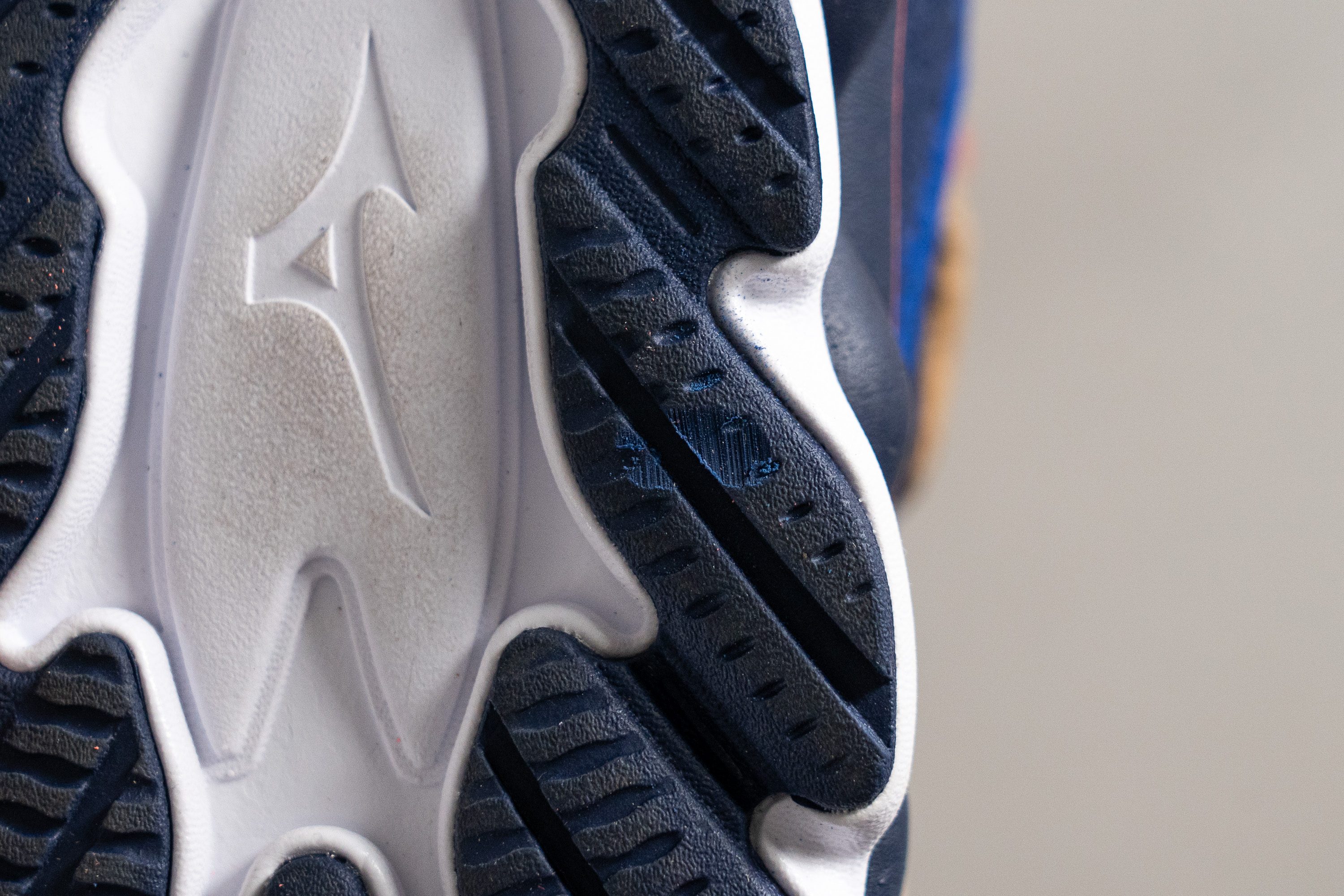
| Wave Sky 7 | 0.5 mm |
| Average | 1.1 mm |
Outsole thickness
But Mizuno didn't stop there. They pushed durability even further by using a 4.6-mm outsole, which we think is a bit excessive.
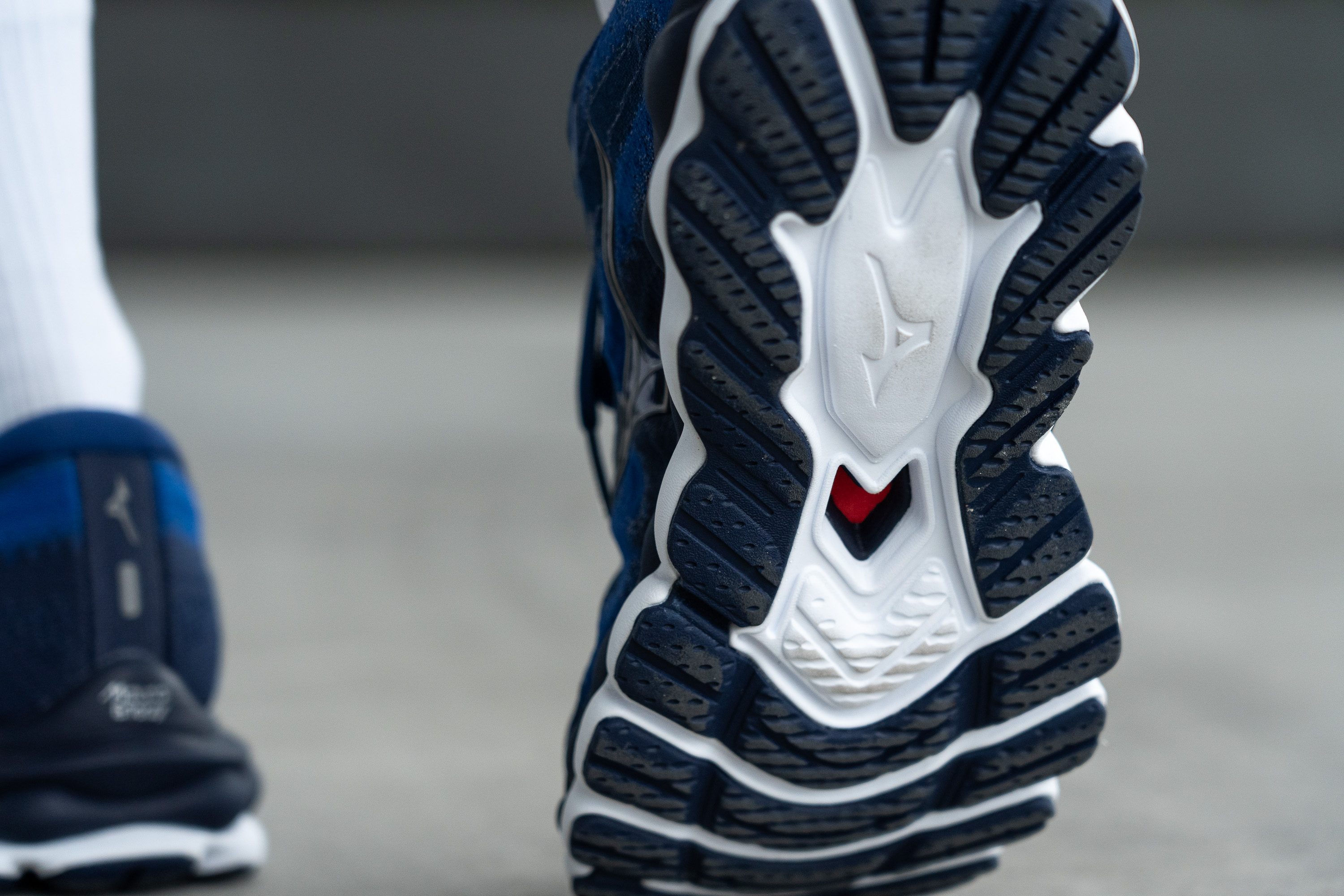
With its incredible performance, the Wave Sky 7 could benefit from shedding some weight. A 3.5-mm outsole would be interesting for the next version.
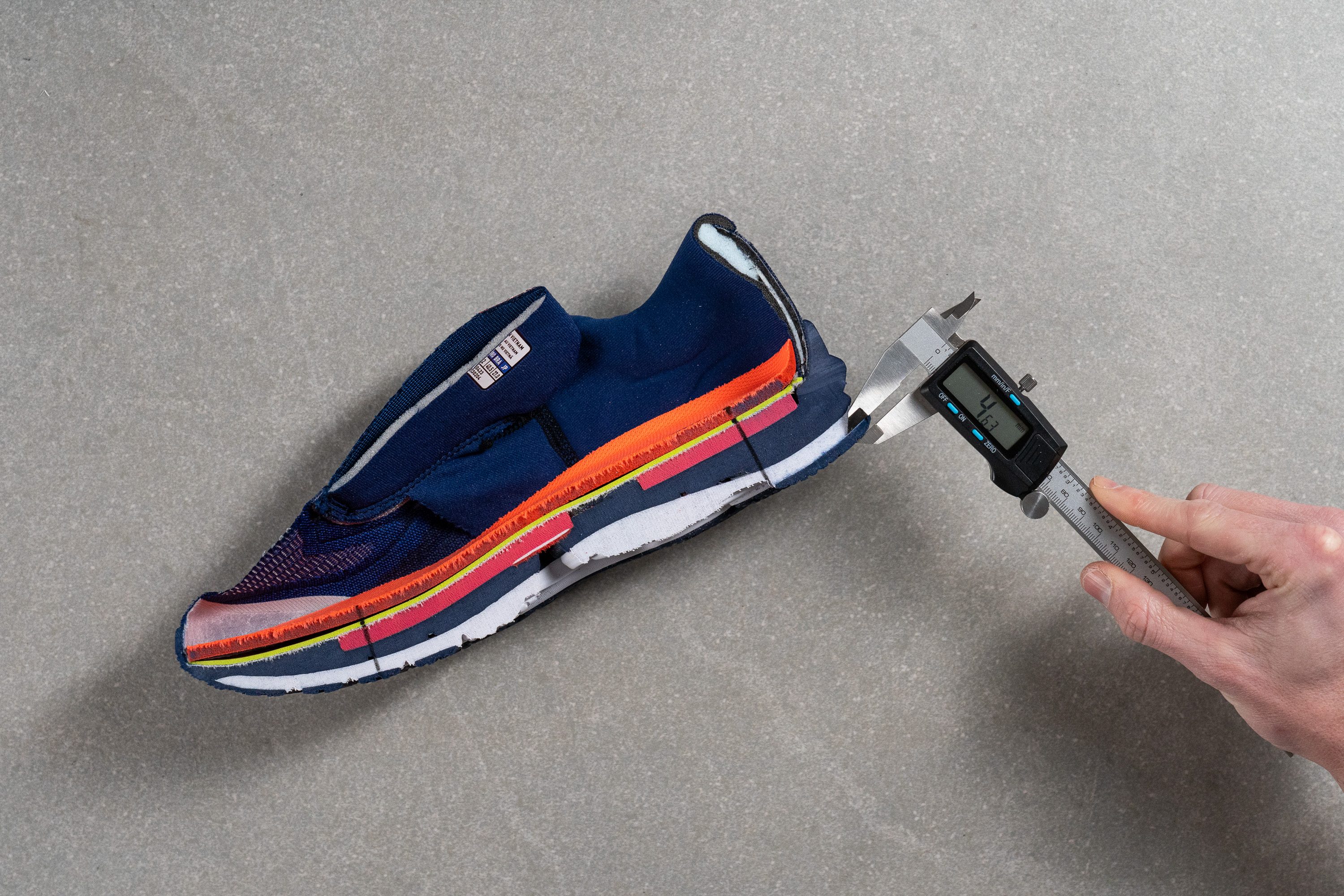
| Wave Sky 7 | 4.6 mm |
| Average | 3.2 mm |
Misc
Insole thickness
The insole matches the shoe's design by being thicker than average. We measured it at 5.6 mm, which enhances the cushioned feel of the Wave Sky 7.
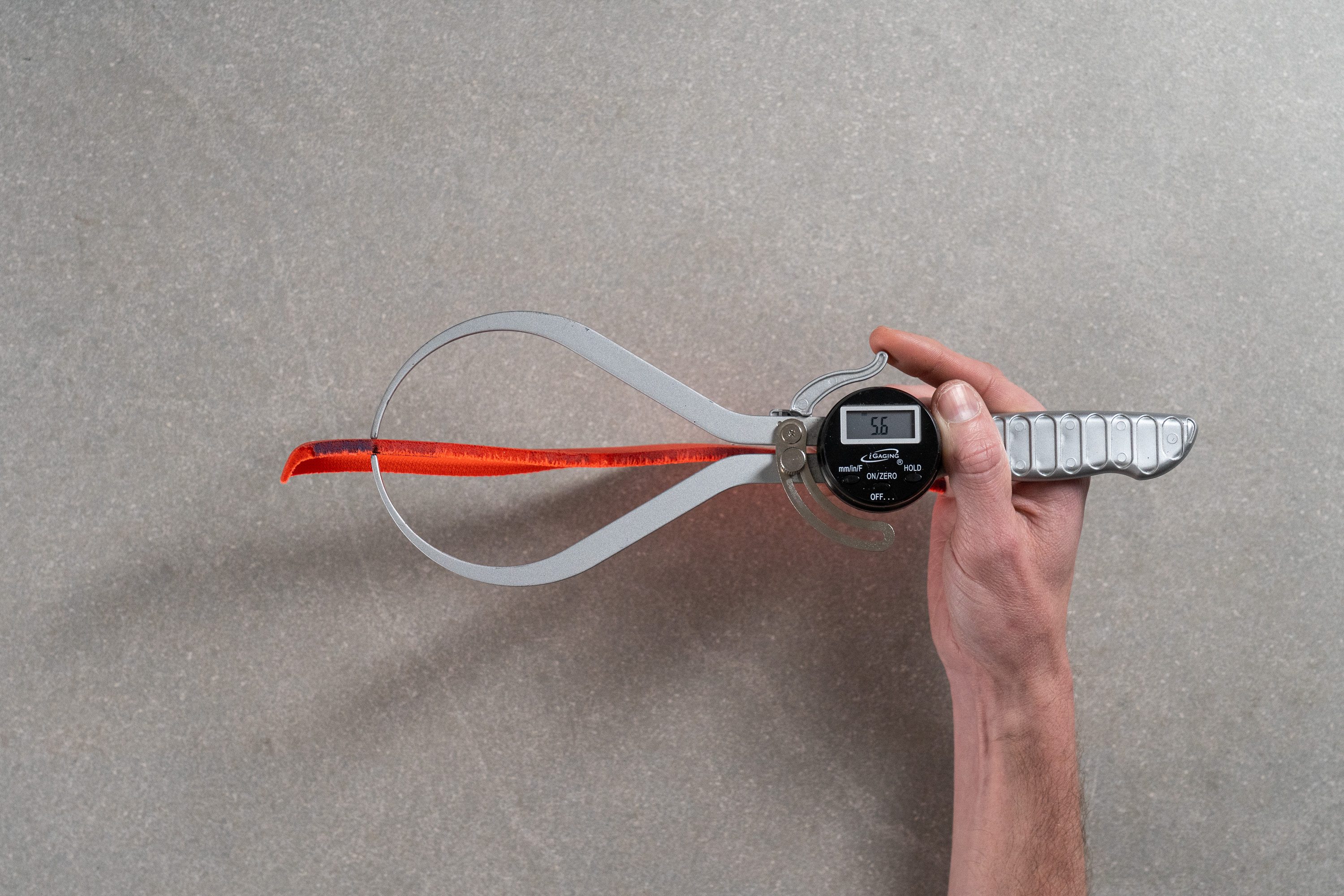
| Wave Sky 7 | 5.6 mm |
| Average | 4.5 mm |
Removable insole
We found the stock insole it's not glued, so removing it is a breeze. Also, thanks to the Mizuno's standard shape, most over-the-counter insoles should fit perfectly.
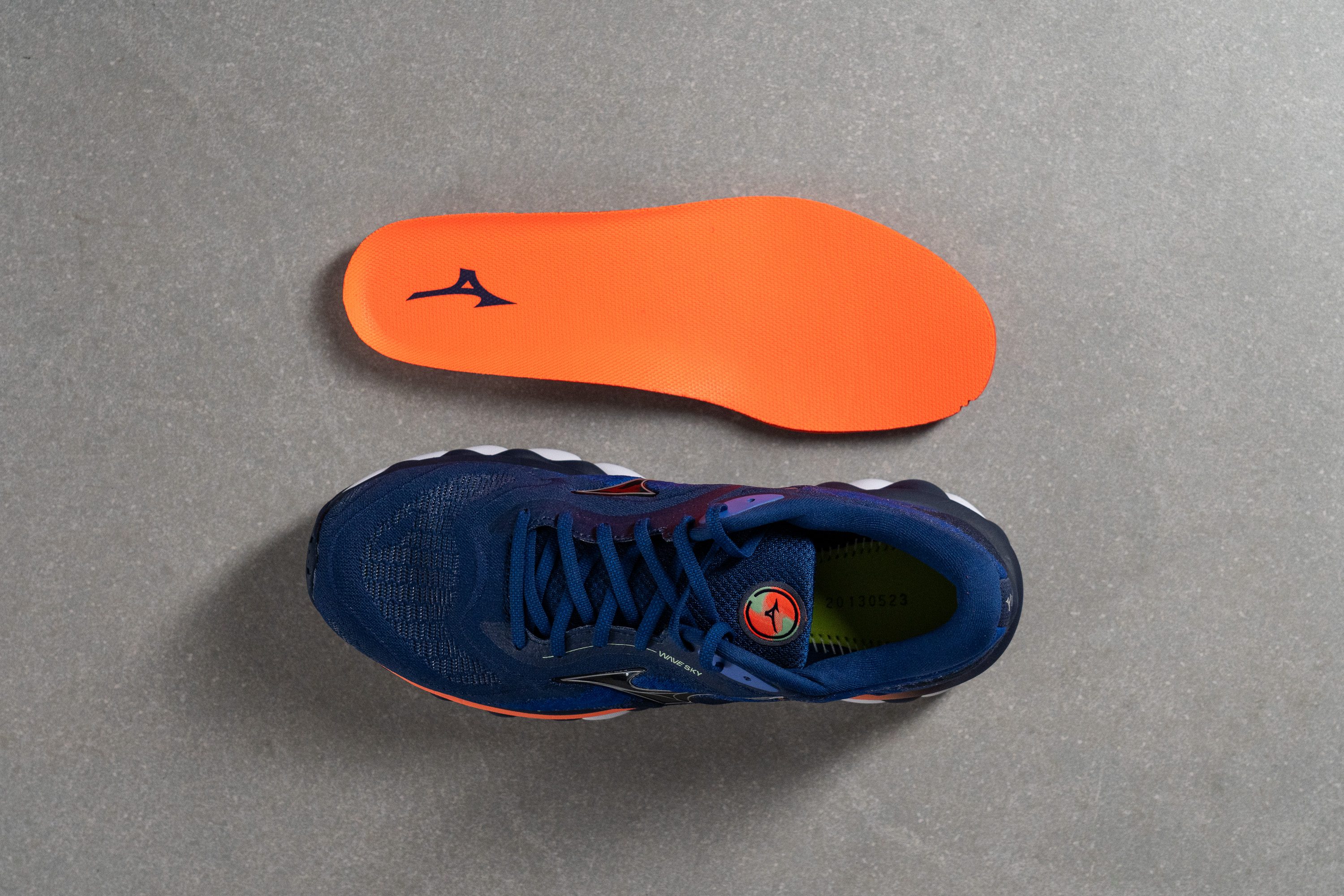
| Wave Sky 7 | Yes |
Midsole softness in cold (%)
As a TPE-based foam, we anticipated impressive performance under cold temperatures. To test this, we placed the shoe in the freezer for 20 minutes and then re-measured it.
The result was a midsole that was only 15.9% firmer, a performance that surpasses many average shoes. This resilience in colder conditions, plus the grippy outsole, are definitely two strong points for winter running!
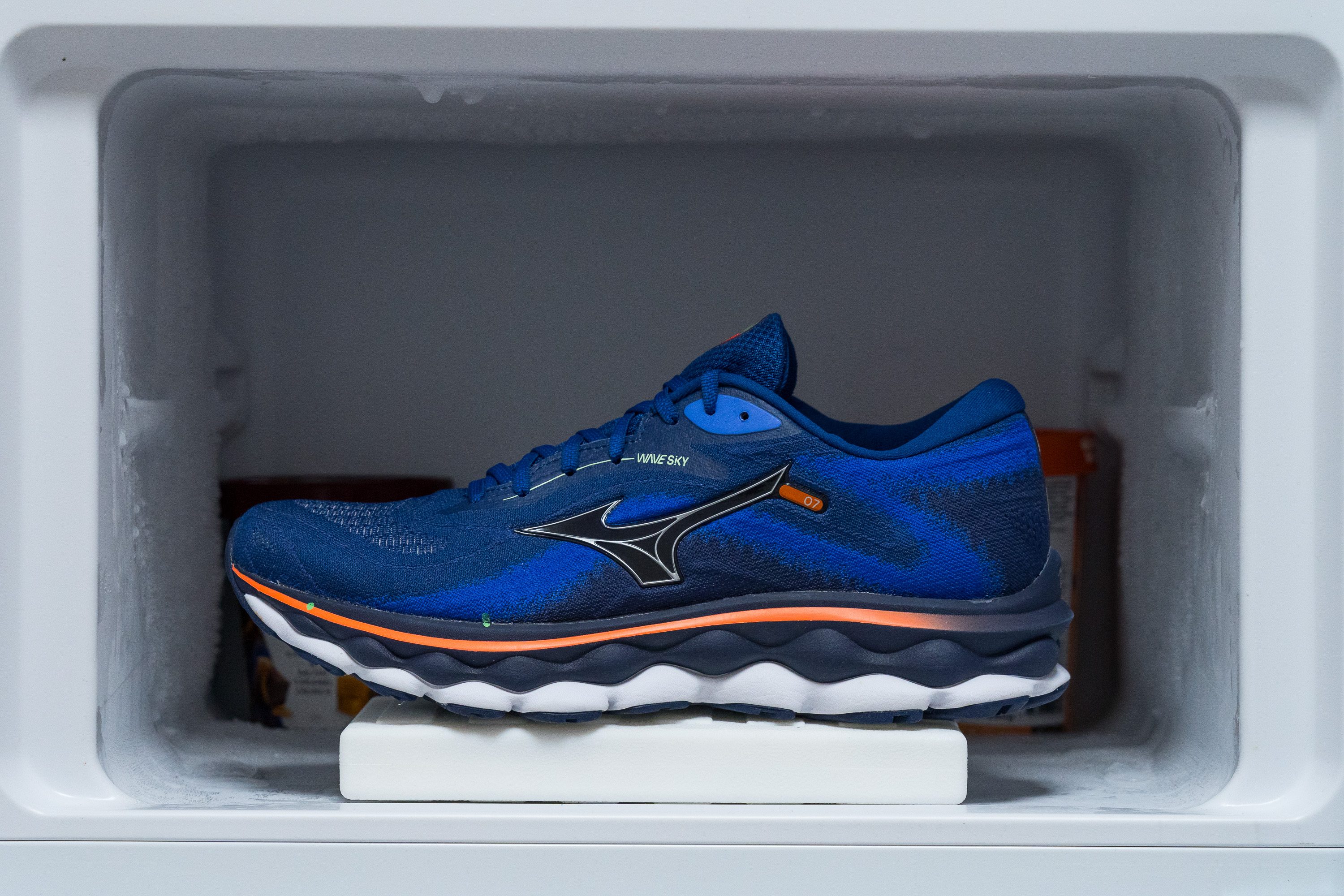
| Wave Sky 7 | 16% |
| Average | 24% |
Reflective elements
For $170, we anticipate top-notch features, and Mizuno certainly delivered here. The shoe's reflective elements are a standout addition, significantly boosting safety for those lovely sunset runs.
| Wave Sky 7 | Yes |
Tongue padding
The tongue is well padded at 6.1 mm, striking an ideal balance between comfort and weight—a blend we find just right.
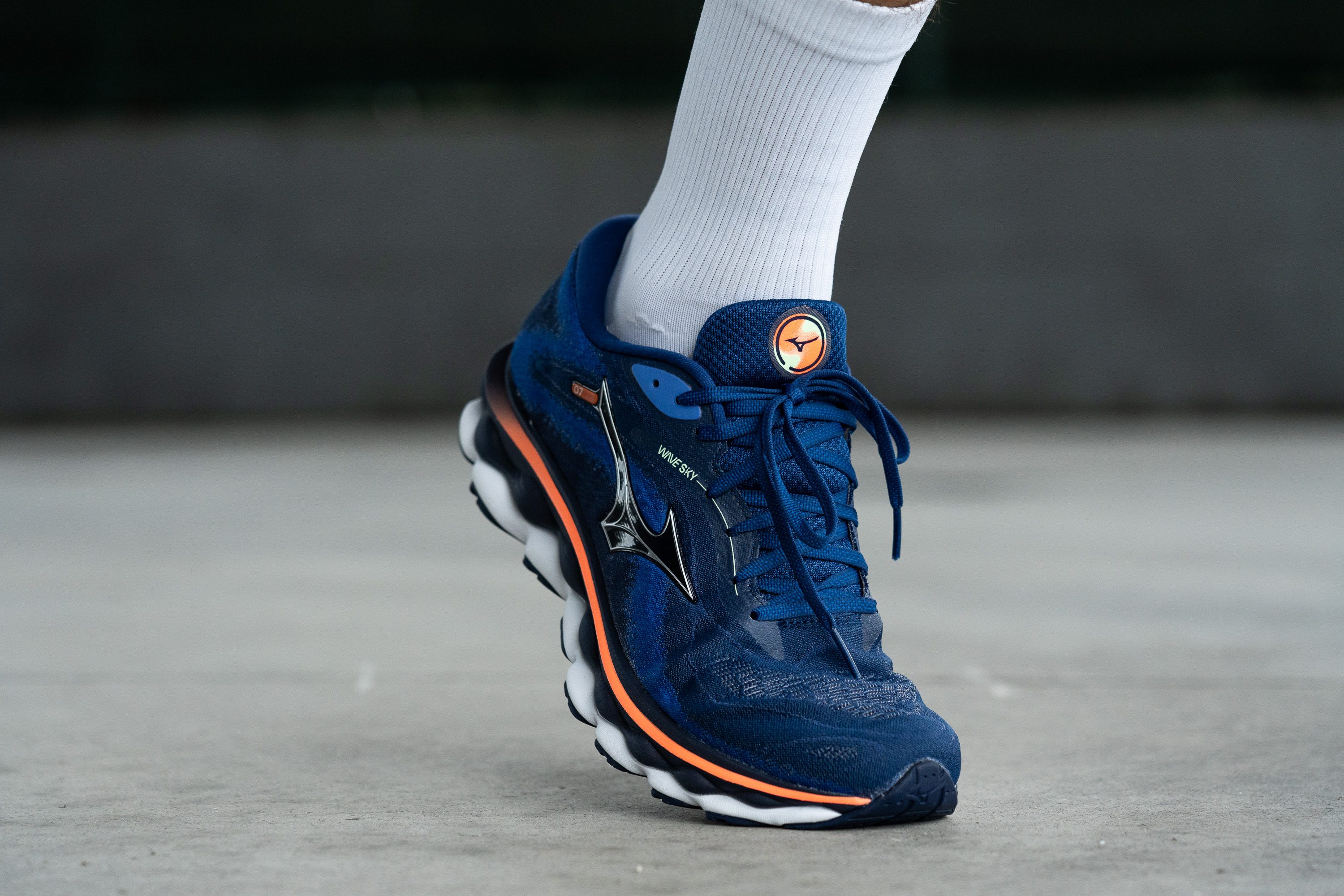
It's incredibly comfortable. We managed some impressively long runs without a single issue.
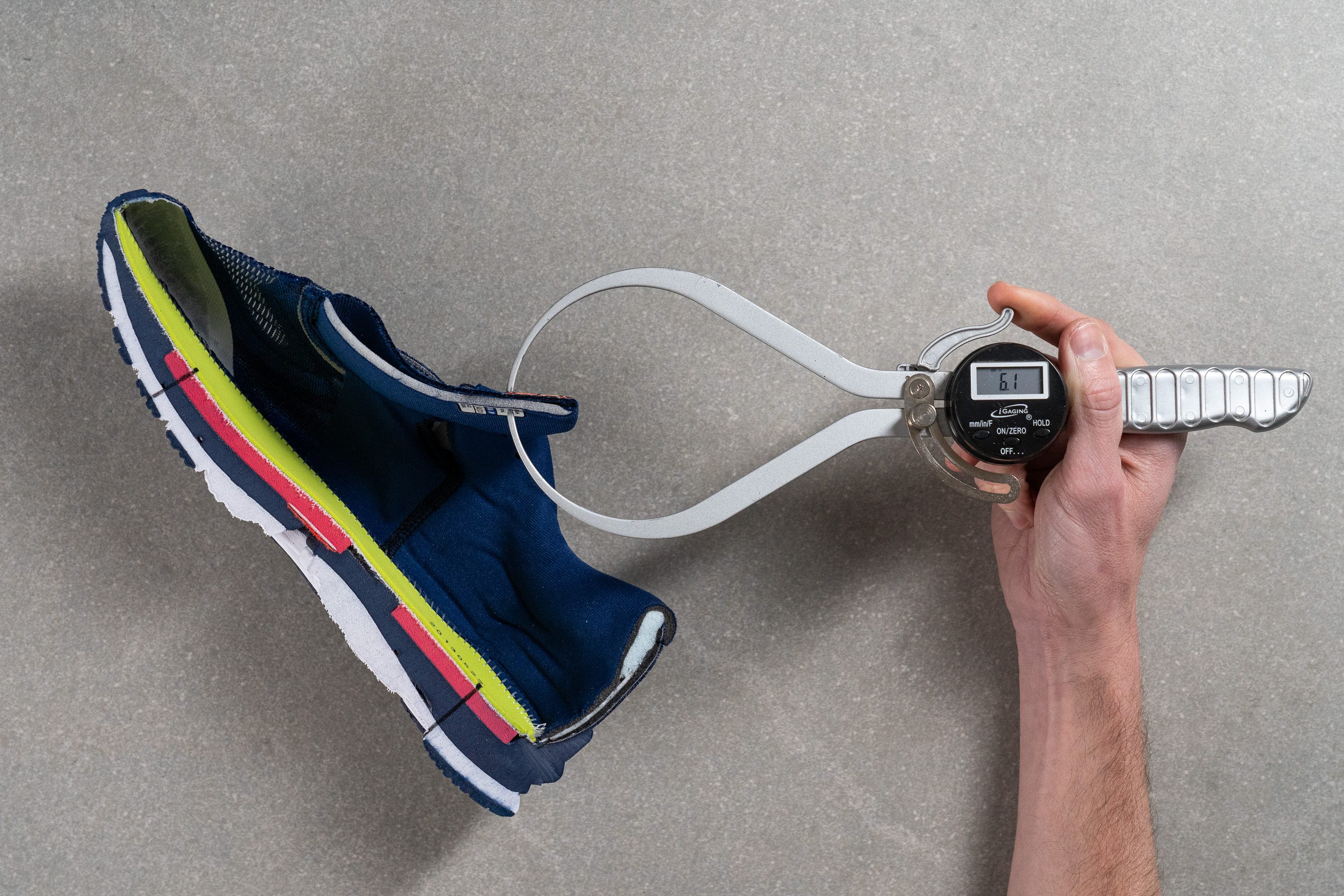
| Wave Sky 7 | 6.1 mm |
| Average | 5.7 mm |
Tongue: gusset type
In the lab, we really hate when a high-priced shoe features a non-gusseted tongue.
Luckily, the Wave Sky 7 doesn't fall into this category. Its semi-gusseted design completely eliminates tongue movement, ensuring a secure fit, especially when picking up the pace.
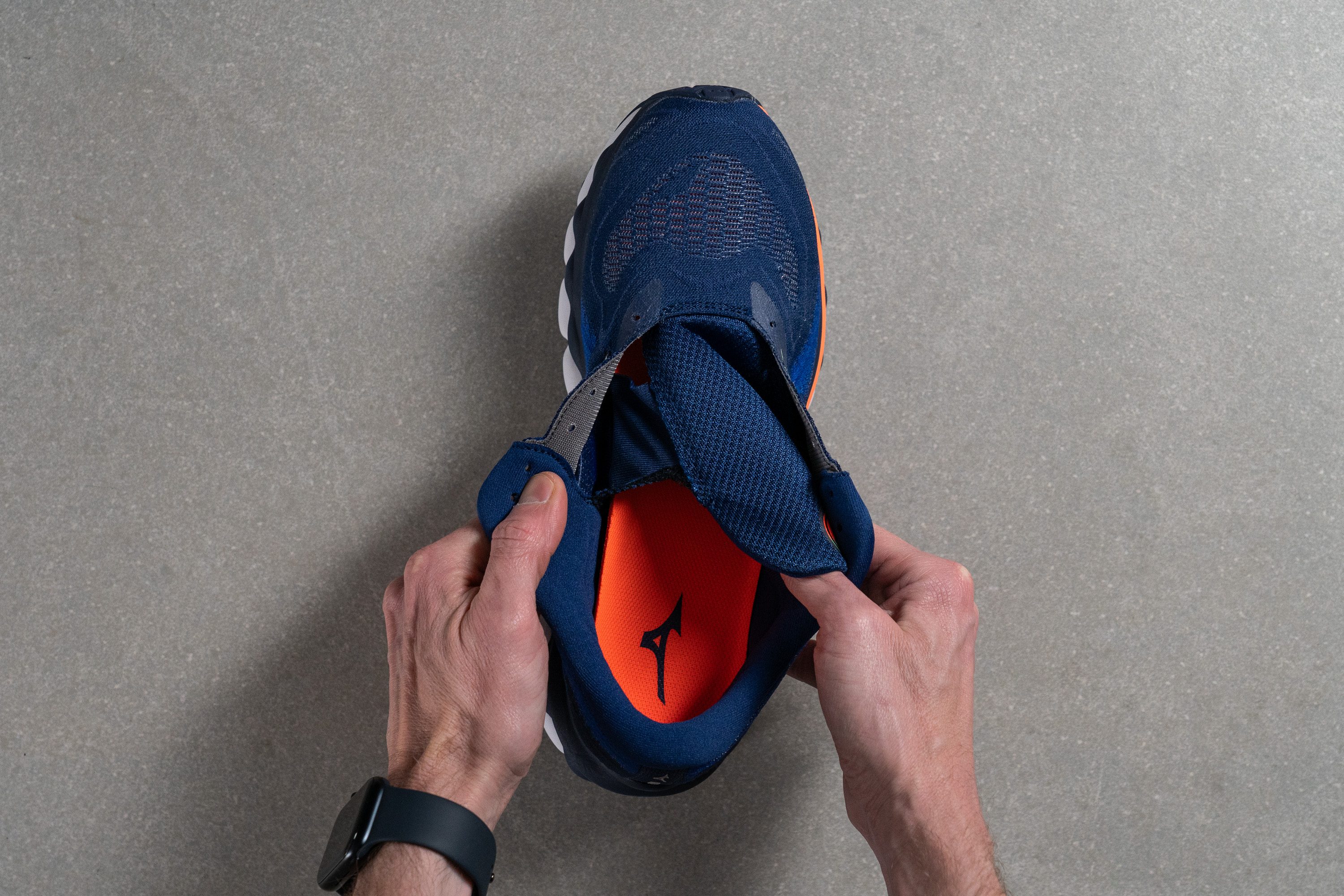
| Wave Sky 7 | Both sides (semi) |
Heel tab
We didn't find a heel tab on the WS7, which wasn't surprising as Mizuno often doesn't include them. However, we noticed we didn't really need one when putting the shoe on our feet.
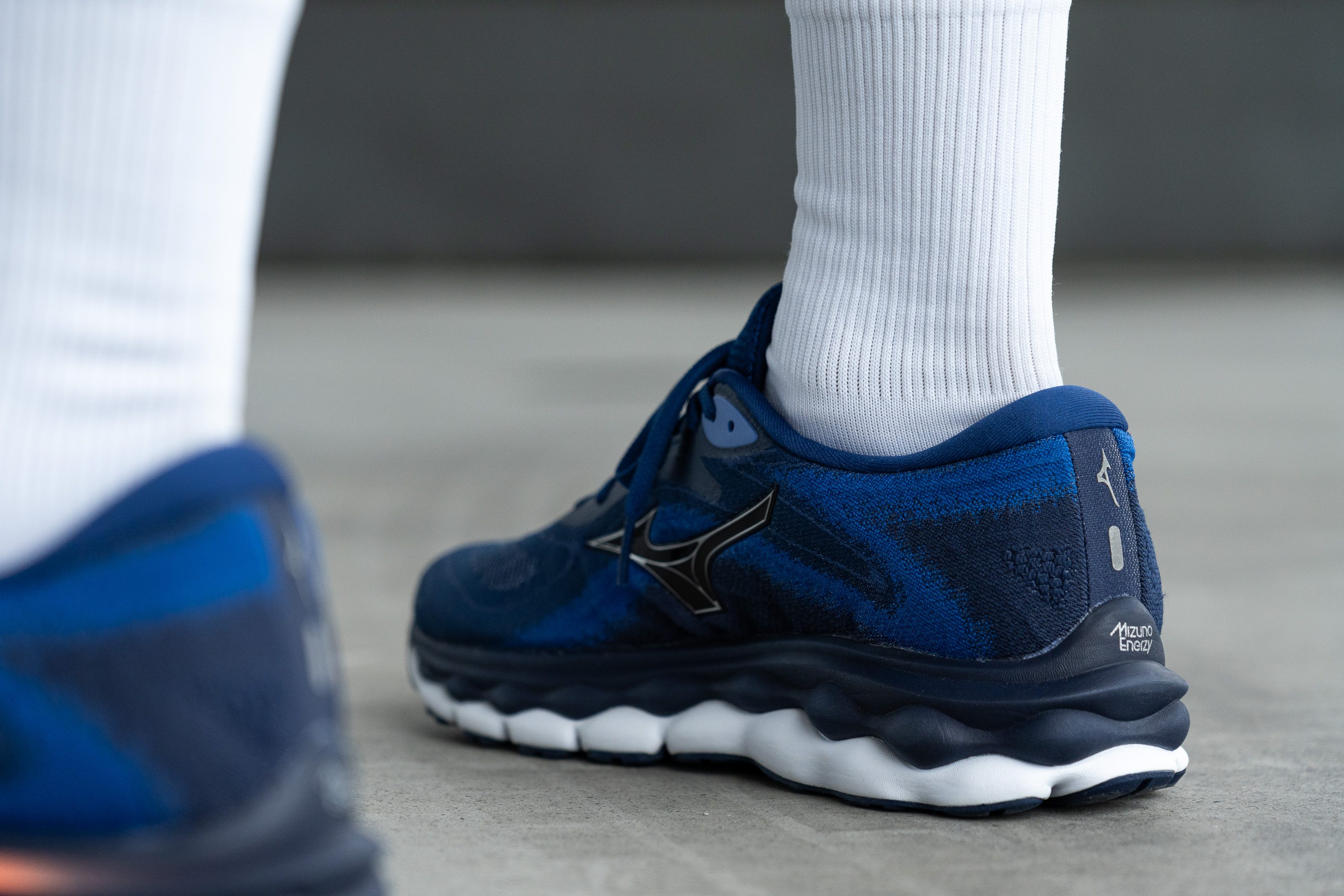
| Wave Sky 7 | None |

